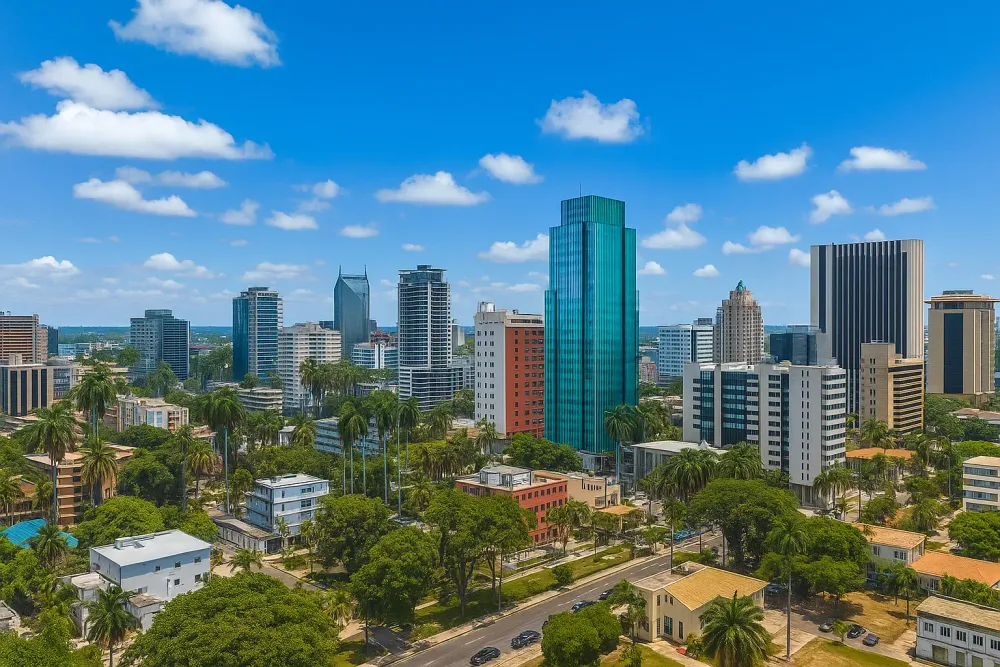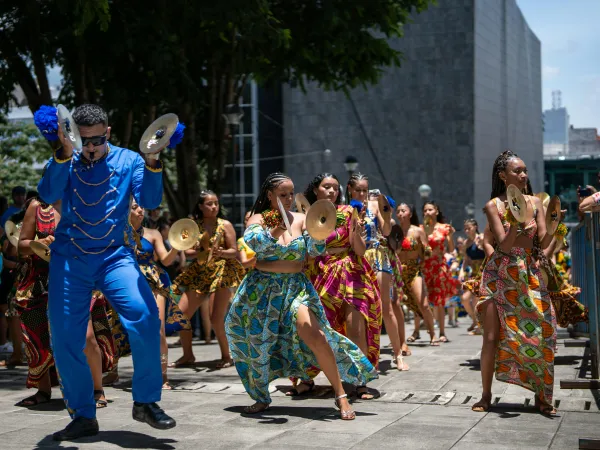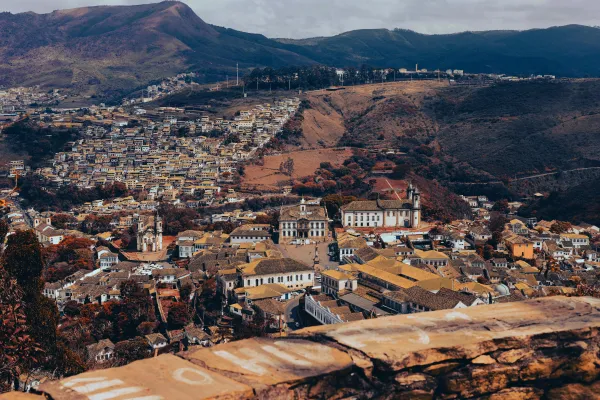30 Things To Do In Lagos That’ll Make You Say “Wait, This Is Nigeria?”
Lagos isn’t just a city—it’s a surge of adrenaline wrapped in sea breeze and street heat. If you call it the city that never sleeps, you’re not wrong—but even that feels like an understatement. This is a place where horns honk like background percussion, Afrobeats spill from danfo buses, and the scent of suya smoke curls through traffic like incense in a cathedral of chaos.
By day, it's a grind. By night, it’s a groove. And no two hours feel the same.
Lagos is a contradiction in motion—frantic yet soulful, modern yet ancestral, maddening and magnetic. Its energy doesn’t just fill the air; it grabs you by the collar and pulls you in. It’s a city that demands engagement and rewards curiosity—but only if you come open, ready, and real.
So no, there isn’t one version of Lagos. There are a thousand, every one alive and loud and layered. And that’s exactly what makes it unforgettable.
Ready to dive in? Let’s explore Africa’s boldest city and what makes it stand out.
The name “Lagos” was given by Portuguese explorers in the 15th century? It means “lakes.”
1. Walk the Canopy at Lekki Conservation Centre
📍 Location: KM 19, Lekki-Epe Expressway, Lekki Peninsula, Lagos
Fun Fact:
This reserve is home to the longest canopy walkway in Africa, stretching 401 meters through the treetops.
If you’re craving nature in a city that rarely slows down, Lekki Conservation Centre is your oasis. Tucked away on the bustling Lekki Peninsula, this 78-hectare reserve is one of the most peaceful places in Lagos.
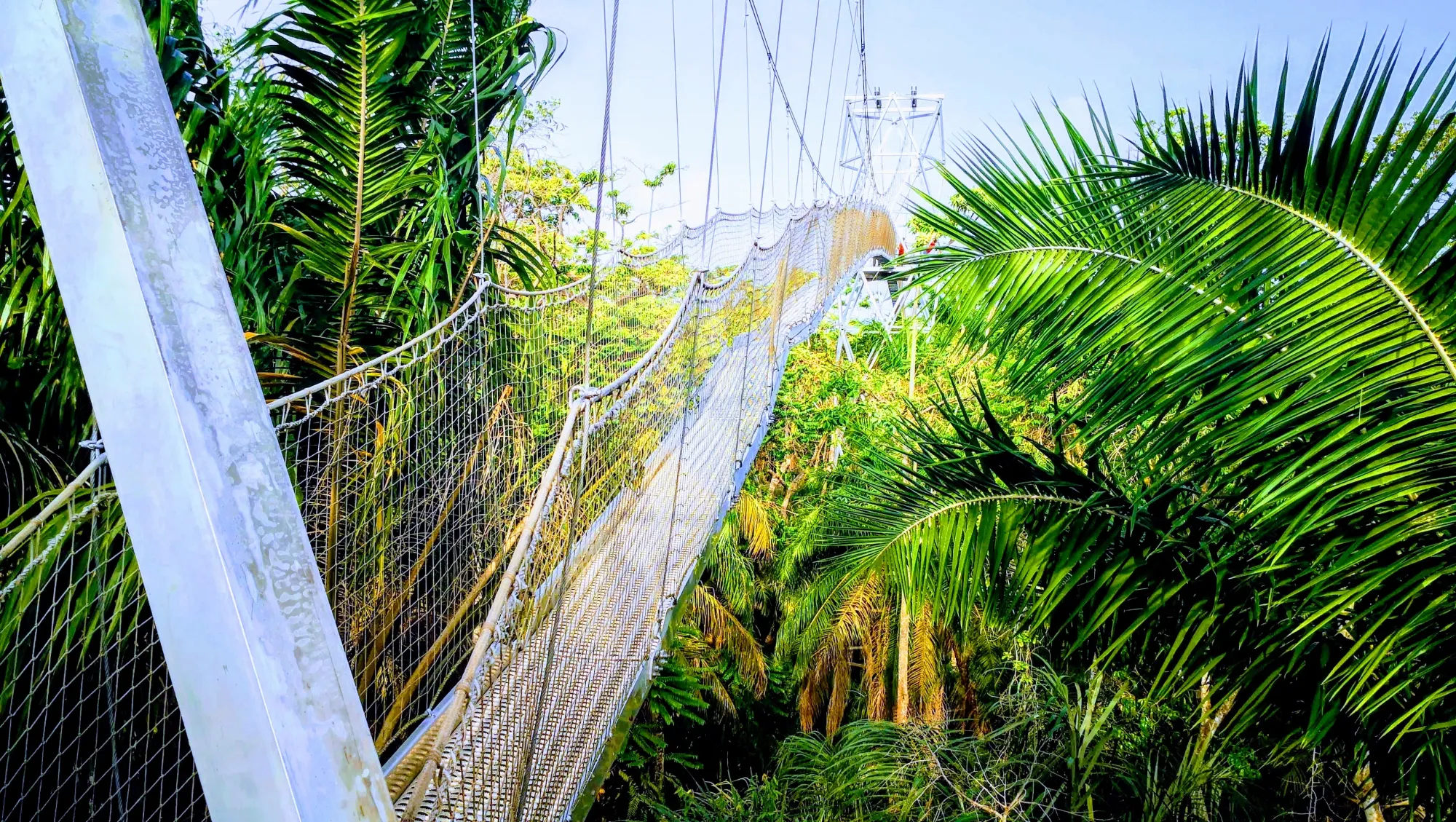
Start your visit with a walk through shaded boardwalks surrounded by mangroves and tropical forest. You might spot mona monkeys, crocodiles, or exotic birds hiding in the trees. But the main draw is the canopy walkway—a thrilling, swaying bridge system high above the forest floor, offering panoramic views and a solid dose of adrenaline.
⭐⭐⭐⭐⭐ - Danuta Morgan
Fantastic. The highlight of my journey to Nigeria. The price was better to go direct than online, get there early to avoid the queues to be honest. Lots to do for the family with an open park, giant board games, fresh food cooked on site and plenty of monkeys for company. Parking available. I was surprised to see how many people turned up and impressed with how conservation is an important ongoing matter to protect!
Essential Info:
- Hours: Daily, 8:30 a.m.–5:00 p.m.
- Admission: ~₦1,000–₦2,000 for entry; ~₦1,000 for canopy access
- Best For: Nature lovers, families, photographers
- Tip: Go early to avoid heat and crowds—weekends get busy
- Website: ncf-nigeria.org
2. Explore Nike Art Gallery
📍 Location: No. 2, Elegushi Road, 3rd Roundabout, Lekki, Lagos
Fun Fact:
The gallery is the vision of Nike Davies-Okundaye, a celebrated Nigerian artist who began teaching traditional arts in rural villages before founding this cultural powerhouse.
This is not your typical gallery stop. With four floors packed from floor to ceiling with bold canvases, beaded crowns, textile art, and wood carvings, Nike Art Gallery is culturally enriching.
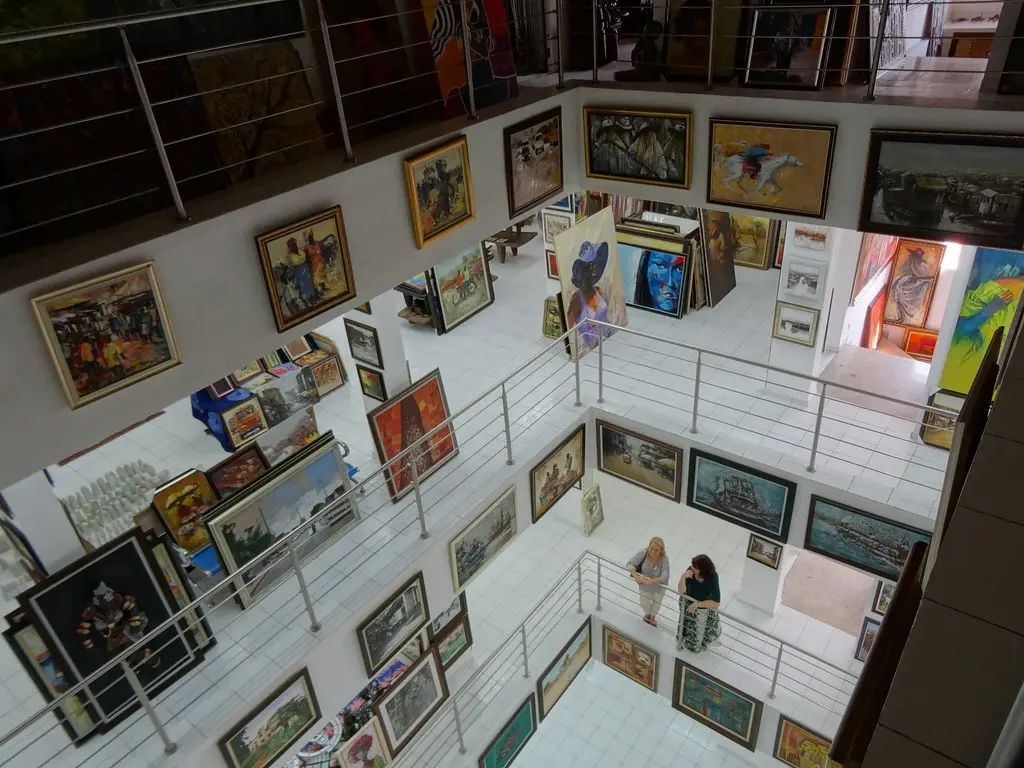
Whether you're a serious collector or just browsing, the gallery is a vibrant crash course in Yoruba tradition, Nigerian history, and modern West African creativity. The staff is welcoming, knowledgeable, and often led by Nike herself, who might personally introduce you to the meaning behind a piece or share a story from her decades-long journey in art education.
Outside, murals and sculptures spill onto the grounds, while inside, the energy is electric—every corner tells a story. Be sure to visit the gift shop for handmade jewelry, batik fabrics, and small artworks you can take home.
⭐⭐⭐⭐⭐ - Dooby Babe
It is an interesting place to visit. Any art lover will love it! Even if you aren't an art lover, you will find something that would interest you and catch your attention. If you are an artist yourself, you'll get a lot of inspiration from the wide array of art work housed here. Entry is free but if you want a guided tour there is a small fee for that. I believe they're open 7 days a week.
Essential Info:
- Hours: Daily, 10 a.m.–6 p.m.
- Admission: Free (donations encouraged)
- Best For: Art lovers, cultural travelers, photographers
- Tip: Ask about textile workshops or art classes if you want a hands-on experience
- Website: nikeart.com
3. Relax at Tarkwa Bay Beach
📍 Location: Off Lagos Harbour, accessible by boat from Marina, CMS, or Banana Island
Fun Fact:
Tarkwa Bay is man-made, originally developed as a breakwater community to protect the Lagos Harbour from ocean surges.
Need a break from Lagos’ hustle? Tarkwa Bay Beach is your island getaway—without leaving the city. Only reachable by boat, this sheltered beach is a local favorite for day-trippers craving soft sand, calm surf, and peaceful vibes far from the city’s noise.
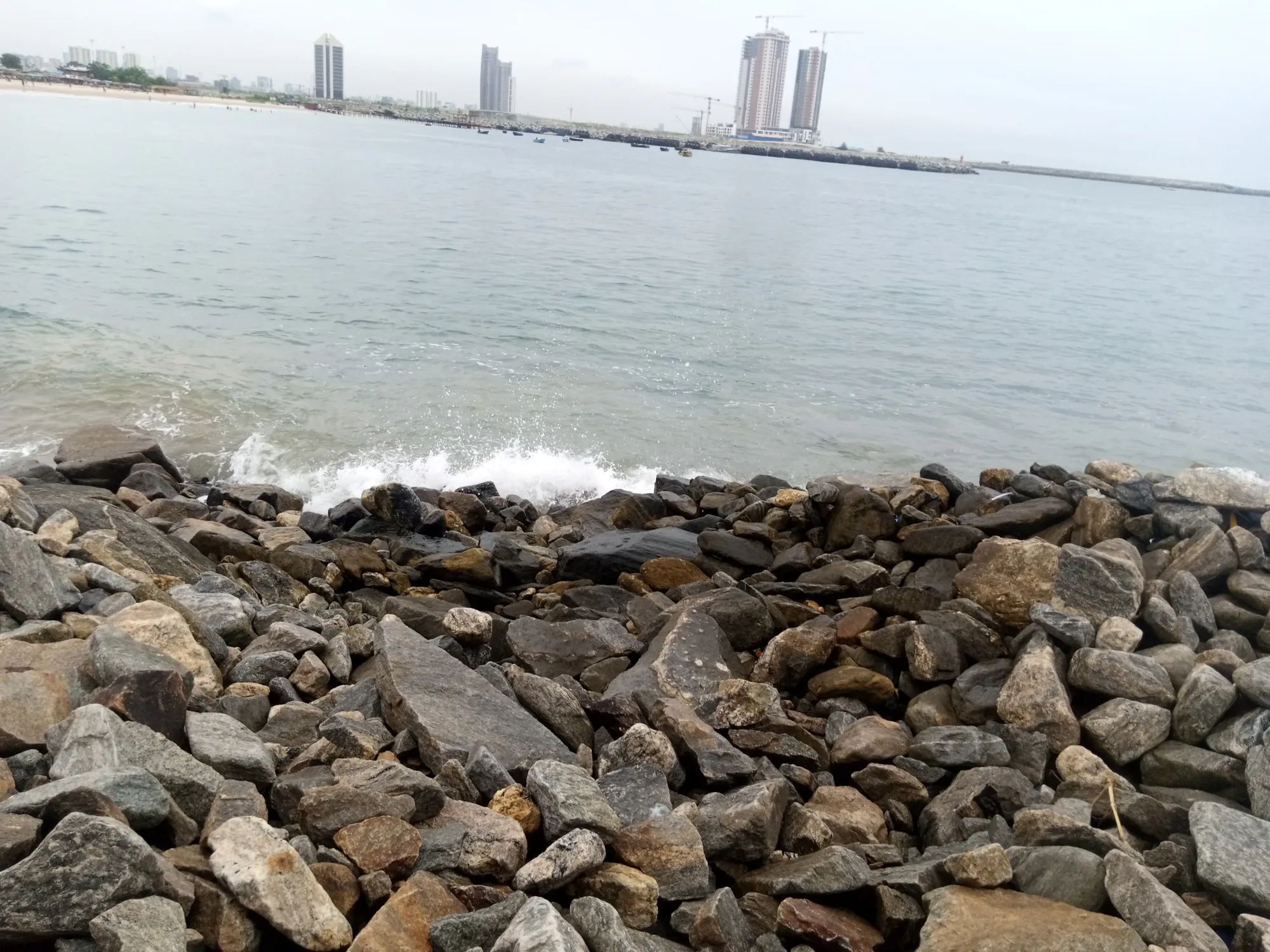
Spend your afternoon lounging under a thatched umbrella, taking a dip in the warm Atlantic, or learning to surf on beginner-friendly waves. Vendors rent out chairs, umbrellas, and boards, and you’ll find cold drinks and grilled seafood being served up by beachside locals.
Essential Info:
- Hours: Daily, sunrise to sunset
- Boat Ride Cost: ₦1,000–₦2,000 round trip (from Marina or Banana Island)
- Admission: ₦500–₦1,000 per person
- Best For: Beach lovers, couples, surfers, photographers
- Tip: Bring cash and your own snacks or drinks—vendors are limited and card payments are rare
- Safety Note: Keep valuables secure and avoid late returns after dark
4. Visit the National Museum Lagos
📍 Location: Onikan, Lagos Island, near Tafawa Balewa Square
Fun Fact:
The museum was founded in 1957, just before Nigerian independence, and is one of the country’s oldest repositories of cultural heritage.
If you're looking to understand the soul of Nigeria, the National Museum Lagos is the place to start. Inside this modest, somewhat weathered building is a treasure trove of pre-colonial artifacts, royal regalia, and sacred art.
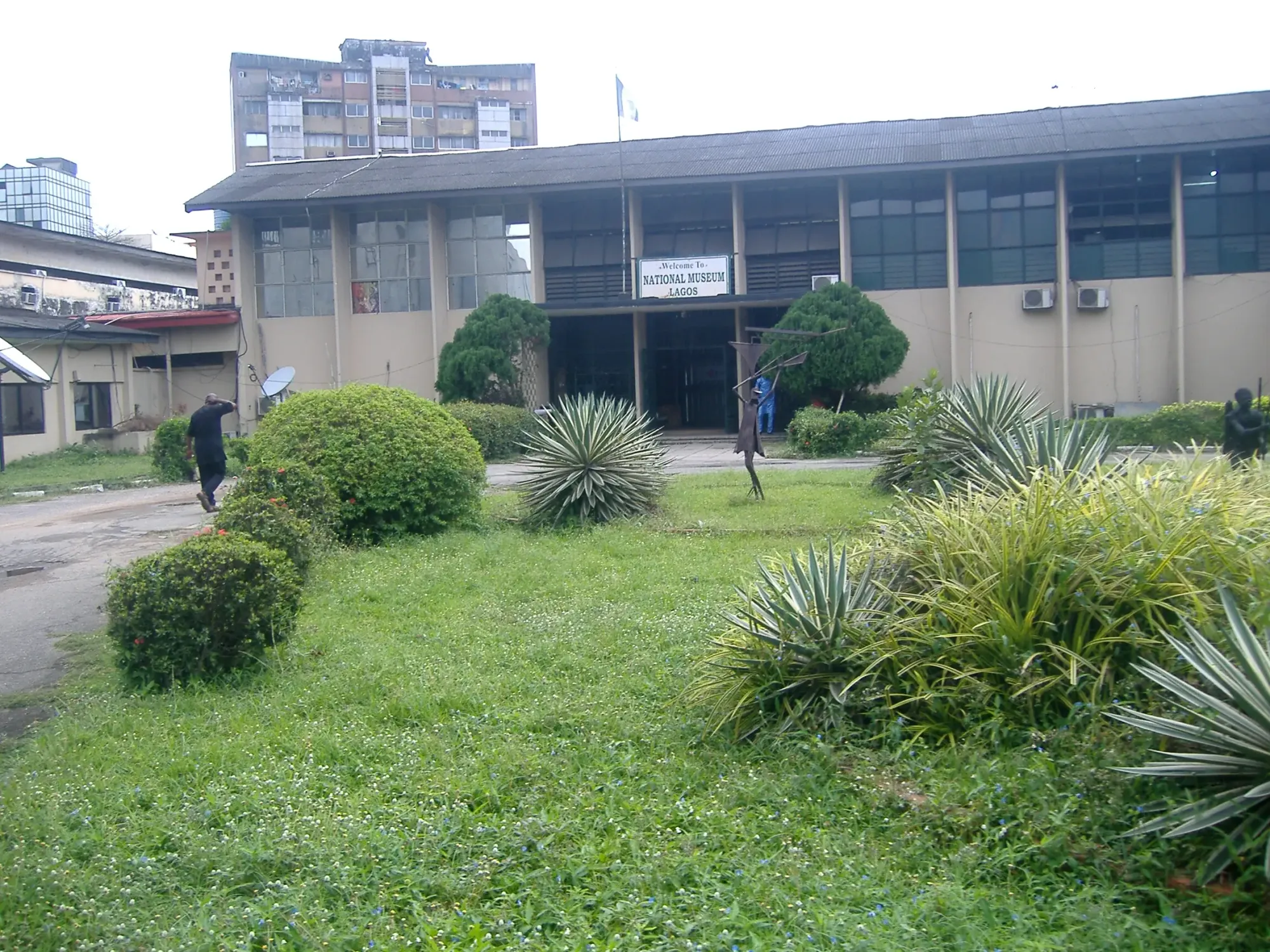
Key highlights include the iconic Nok terracotta sculptures (dating back to 500 BC), ritual masks, and a stunning display of Benin bronzes, which tell stories of craftsmanship, empire, and resistance. The museum also houses the car in which former Head of State Murtala Mohammed was assassinated, offering a sobering look at Nigeria's political past.
Essential Info:
- Hours: Mon–Sat, 9:30 a.m.–3:30 p.m. (closed Sundays)
- Admission: ₦500–₦1,000 (cash only)
- Best For: History buffs, students, cultural travelers
- Tip: Hire a guide on-site (₦1,000–₦2,000) for deeper context—the signage is limited
- Website: No official website, but visit nigeriamuseums.org for updates
Lagos was the capital of Nigeria until 1991? It’s still the country’s economic capital.
5. Attend a Show at Terra Kulture
📍 Location: Plot 1376, Tiamiyu Savage St, Victoria Island, Lagos
Fun Fact:
Terra Kulture’s founder, Bolanle Austen-Peters, is behind some of Nigeria’s most acclaimed theatrical productions, including Saro the Musical and Fela and the Kalakuta Queens.
If you want a real taste of Nigerian culture that’s alive, loud, and unfiltered, then a night at Terra Kulture is a must.
Start with the art gallery, which showcases rotating exhibits of contemporary Nigerian artists. Then grab a seat in the Terra Arena, where stage plays, spoken word, and live music bring Lagos’ energy to life with unapologetic style. Performances often reflect Nigerian society—raw, funny, political, and emotional.
Before or after the show, stop by the on-site restaurant for jollof rice, grilled catfish, or their famed palm wine cocktails. It’s a full evening of Lagos: art, food, and fierce creativity under one roof.
⭐⭐⭐⭐⭐ - Sarzi Micheal
It’s a nice space that houses a couple of things you might find interesting. They have a restaurant, a book store, a mini art gallery, a space for stage plays. Came here to see a stage play and before it started I tried the restaurant. I didn’t have a proper meal as I wasn’t hungry. Had their ram suya and a mocktail, and to be honest It was just okay. The drinks can be better. The ambience of the restaurant had a rustic feel to it and i think it’s was pretty cool. Enjoyed the play and would not mind coming back for another experience.
Essential Info:
- Hours: Tues–Sun, 9 a.m.–10 p.m. (closed Mondays)
- Tickets: Varies by event (~₦5,000–₦15,000); purchase on-site or via terrakulture.com
- Best For: Theatergoers, art lovers, date nights
- Tip: Book early for weekend shows—they often sell out fast
6. Experience Freedom Park
📍 Location: 1 Hospital Rd, off Broad Street, Lagos Island
Fun Fact:
Once a colonial prison where political prisoners were held, Freedom Park has been transformed into a symbol of artistic freedom and cultural resilience.
Few places in Lagos tell a deeper story than Freedom Park. What used to be Her Majesty’s Broad Street Prison is now a peaceful, open-air cultural complex.
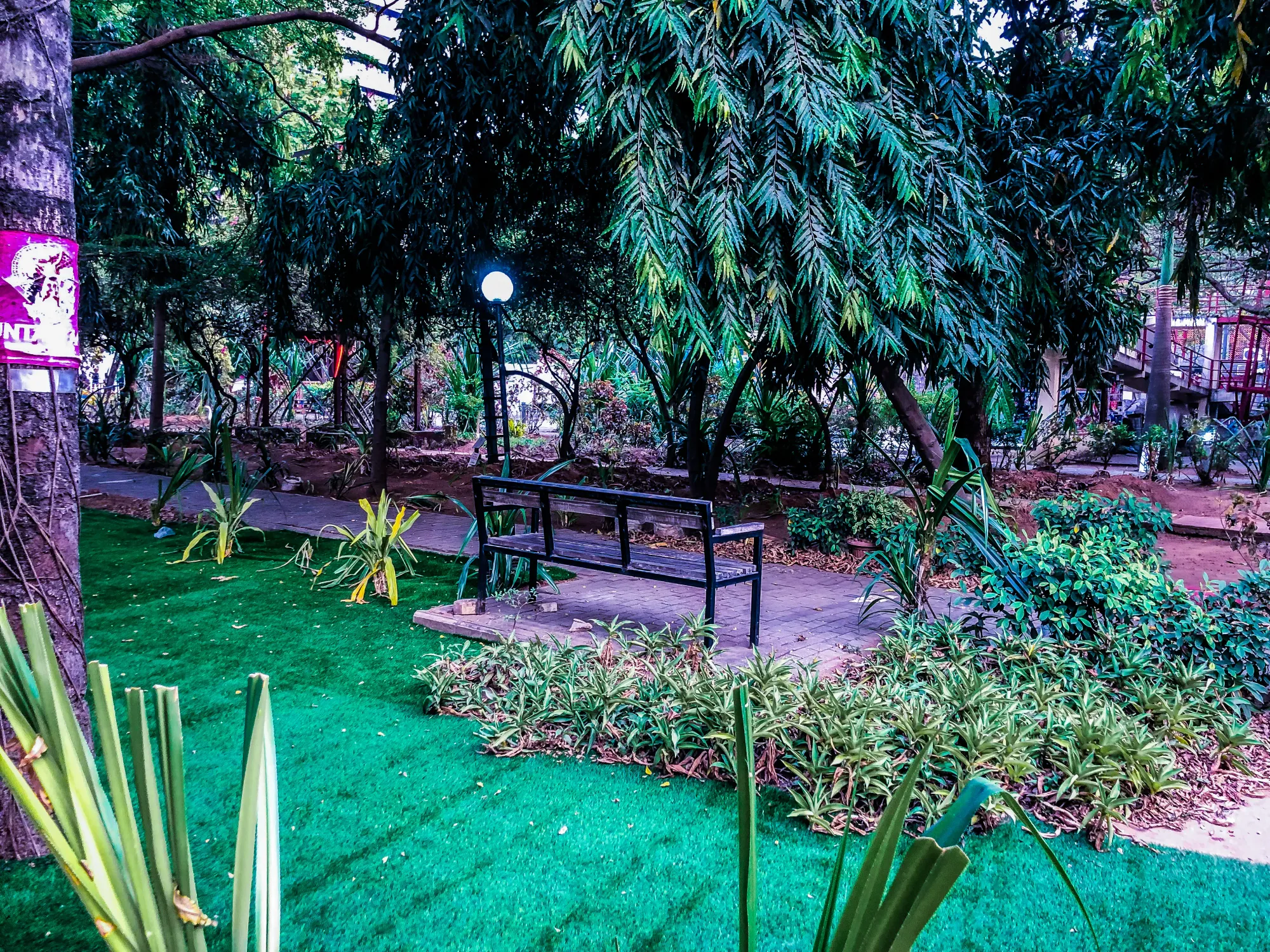
During the day, the park is a calm, tree-lined space filled with sculptures, fountains, and remnants of prison walls that whisper Lagos’ colonial and political past. But as the sun sets, it morphs into a cultural playground. There’s always something happening—poetry nights, jazz concerts, food festivals, film screenings, and impromptu dance battles.
⭐⭐⭐⭐⭐ - Jesusson
It's a beautiful place!! The history, the heritage, the ambience, the atmosphere, trees and greenery is all sensational - the Entry Gate feels is a little understandable.
- FYI; I'm part of a team working on a mural on the perimeter fence of Freedom park, the part opposite St Nicolas Hospital and we also painting the Bus inside the park close to the main stage - check photos :-)
Essential Info:
- Hours: Daily, 10 a.m.–10 p.m. (events often run late)
- Admission: ₦200–₦500 (events extra)
- Website: freedomparklagos.com
- Best For: Music lovers, culture vultures, history buffs
- Tip: Go in the late afternoon and stay for evening performances—weekends are especially vibrant
7. Tour the Kalakuta Republic Museum
📍 Location: 8, Gbemisola St, Allen Avenue, Ikeja, Lagos
Fun Fact:
The name “Kalakuta Republic” came from Fela Kuti’s belief that his home was a sovereign nation, independent of Nigeria’s corrupt systems.
You can’t talk about Lagos—or Nigeria, really—without mentioning Fela Anikulapo Kuti, the rebellious, genius godfather of Afrobeat. Touring the Kalakuta Republic Museum, his former home turned living shrine, is one of the most powerful and essential things to do in Lagos for music fans and cultural explorers alike.
Inside, the museum preserves Fela’s bedroom exactly as he left it, complete with his shoes, saxophones, and iconic performance outfits. The walls tell stories of his activism, police raids, and the music that made him both a national hero and a target of the establishment.
You’ll also see a rooftop stage where Fela performed intimate shows, and a memorial crypt where he’s buried. It’s raw, emotional, and deeply inspiring—especially when you realize how much of his voice still echoes through modern Nigerian music and protest culture.
⭐⭐⭐⭐⭐ - fina akalonu
Grew up here so this place definitely feels like home. The rooftop bar gives a beautiful scenery of the neighborhood the great legend lived in before he passed away. The ambience is one you’d definitely bask in.
Essential Info:
- Hours: Mon–Sat, 10 a.m.–6 p.m. (closed Sundays)
- Admission: ₦1,000–₦2,000 with a guided tour
- Best For: Music lovers, history buffs, counterculture seekers
- Tip: Ask your guide about Fela’s 27 wives—they’re part of the legend
- Website: kalakutamuseum.com.ng
8. Shop at Lekki Arts and Crafts Market
📍 Location: Oba Elegushi International Market, Lekki, Lagos
Fun Fact:
Also known as Jakande Art Market, this open-air bazaar is one of the largest craft markets in Lagos, with goods from all over West Africa.
If you're looking for meaningful souvenirs—or just want to explore Lagos’ vibrant artisan culture—Lekki Arts and Crafts Market is a must. It’s loud, colorful, and beautifully chaotic, with hundreds of stalls selling handmade goods like woven baskets, beaded jewelry, brass sculptures, and rich Ankara fabrics.
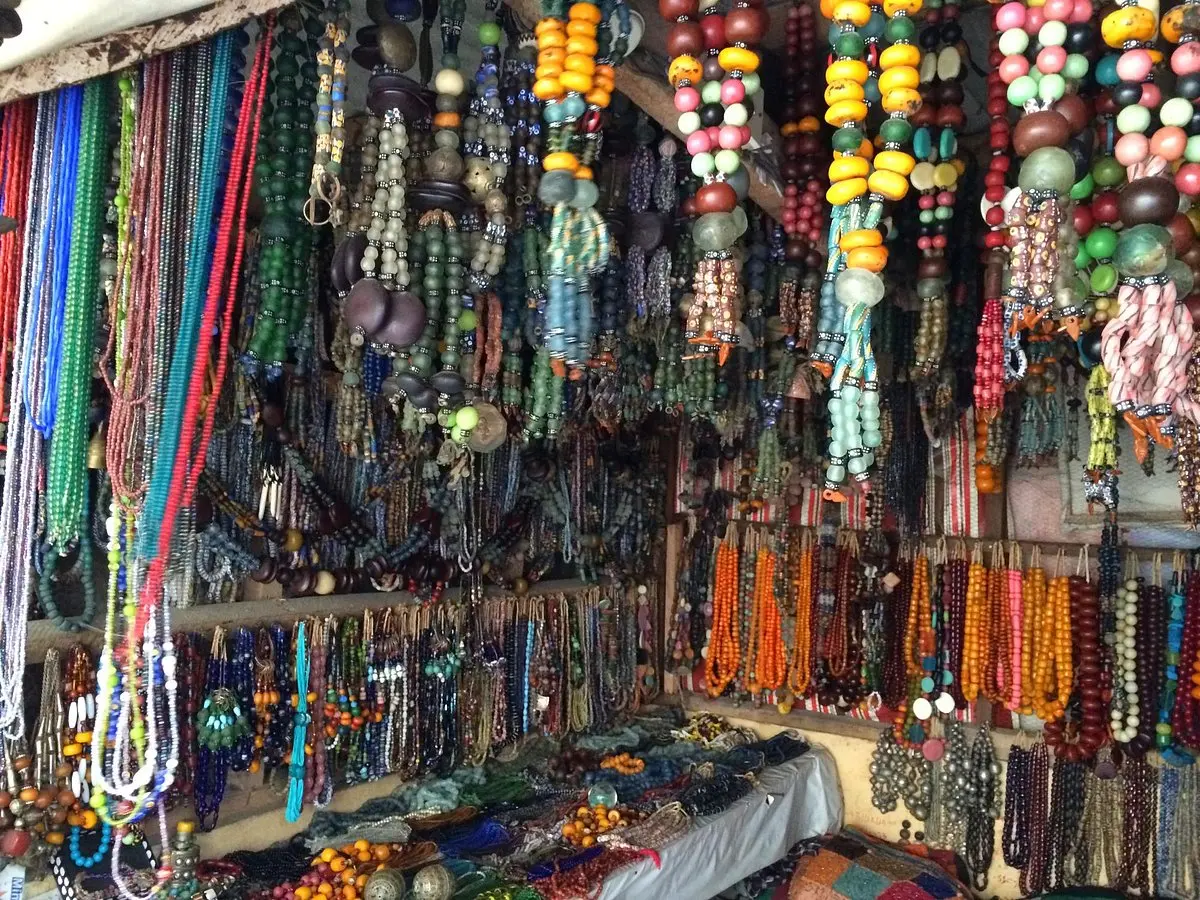
More than just shopping, it's an experience: artists working in real time, vendors sharing the backstory behind each mask or painting, and the chance to bargain like a Lagosian (respectfully, of course).
⭐⭐⭐⭐⭐ - Travel muse by Sangeeta
A vibrant hub of African creativity!
Visiting Lekki Art and Craft Market was a truly enriching experience. The market is filled with an incredible variety of handmade items—beautiful paintings, intricate beadwork, wood carvings, leather goods, traditional fabrics, and unique souvenirs you won’t find anywhere else.
Each stall showcases the talent and creativity of local artisans, and the sellers are usually open to friendly bargaining. The atmosphere is colorful, lively, and full of authentic African charm. Whether you’re a tourist looking for keepsakes or a local seeking unique home décor, this place is a treasure trove.
Do wear comfortable shoes and be prepared to explore narrow lanes. The market isn’t very polished, but that’s part of its raw appeal. I left with some amazing pieces and even better memories. A must-visit for anyone who appreciates arts and culture!
Essential Info:
- Hours: Daily, 9 a.m.–6 p.m.
- Admission: Free (bring cash for purchases)
- Best For: Shoppers, culture lovers, souvenir hunters
- Tip: Wear comfortable shoes—the paths are sandy and uneven
- Safety Note: Go during the day and stick to busier paths; petty theft can occur in less crowded areas
9. Stroll Through Badagry Slave Museum
📍 Location: Badagry Town, Lagos State (approx. 2 hrs from central Lagos)
Fun Fact:
Badagry was one of the first slave ports in West Africa, and its "Point of No Return" marks where enslaved Africans were shipped across the Atlantic—never to return.
Few places will leave you as humbled and haunted as the Badagry Slave Museum. Located in a historic coastal town west of Lagos, this museum offers one of the most powerful Lagos itineraries for travelers seeking a deeper understanding of the region’s past.
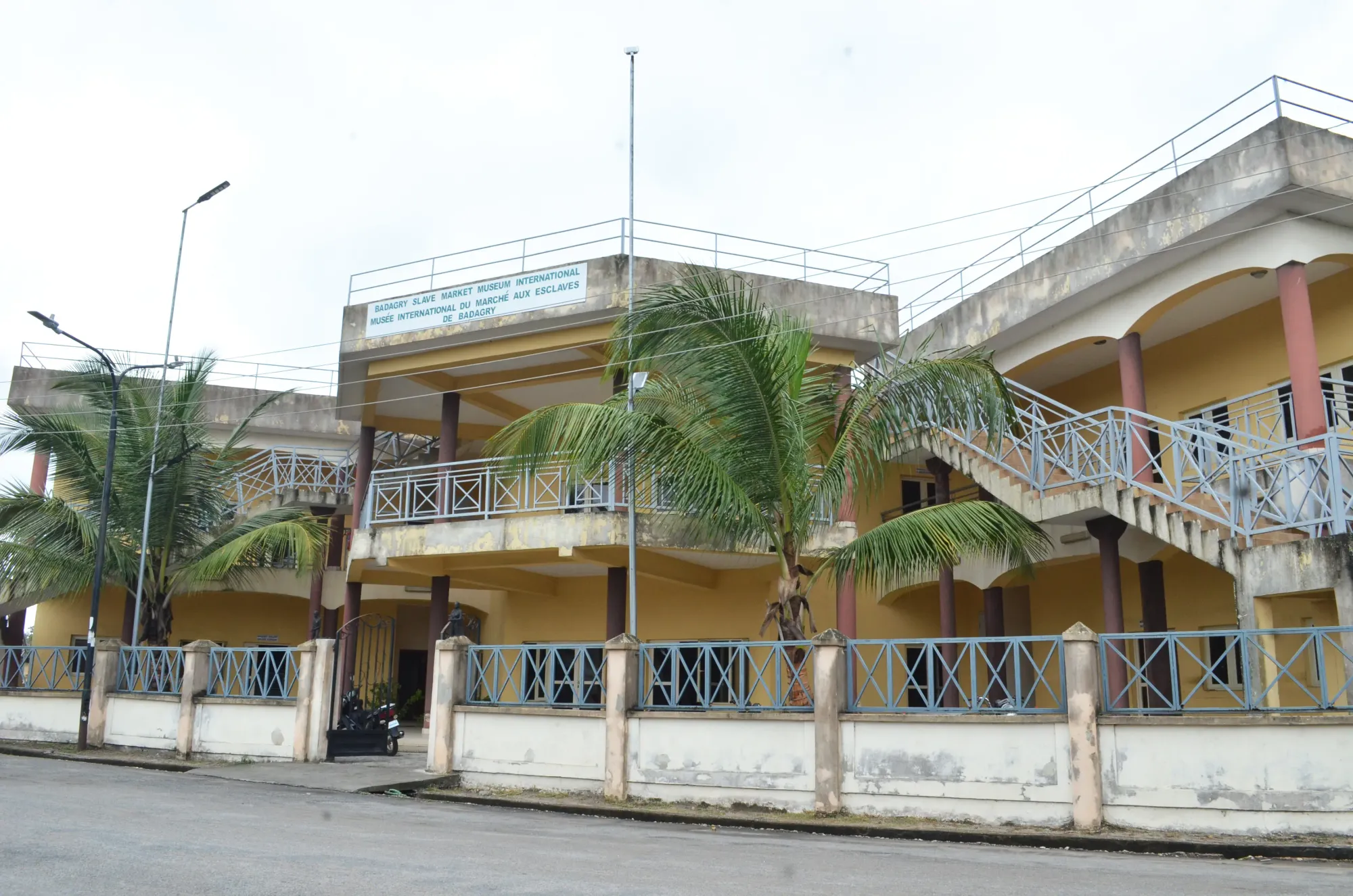
Guided tours walk you through preserved buildings—slave barracoons, colonial relics, and missionary houses—filled with chilling artifacts: chains, branding irons, and auction records. The journey ends at the "Point of No Return", a narrow sandy path that leads to the ocean, where captives were loaded onto slave ships bound for the Americas.
Essential Info:
- Hours: Daily, 9 a.m.–6 p.m.
- Admission: ₦500–₦1,000 (guided tours extra)
- Best For: History seekers, educators, conscious travelers
- Tip: Go with a certified guide who can contextualize the painful legacy with compassion and accuracy
- Note: Allow 1.5–2 hours for the drive from Lagos; early start recommended
Lagos' iconic yellow danfo buses are modeled after 1960s Volkswagen Kombis?
10. Enjoy Live Music at New Afrika Shrine
📍 Location: 1 Nerdc Rd, Agidingbi, Ikeja, Lagos
Fun Fact:
The original Afrika Shrine was destroyed in 1977. The New Shrine was built by Femi and Yeni Kuti, Fela’s children, as a modern homage to their father’s revolutionary spirit.
If the Kalakuta Museum is Fela’s memorial, the New Afrika Shrine is his eternal party. This is Afrobeat ground zero—a raw, electric venue where music, rebellion, and Lagos nightlife collide in an unforgettable experience.
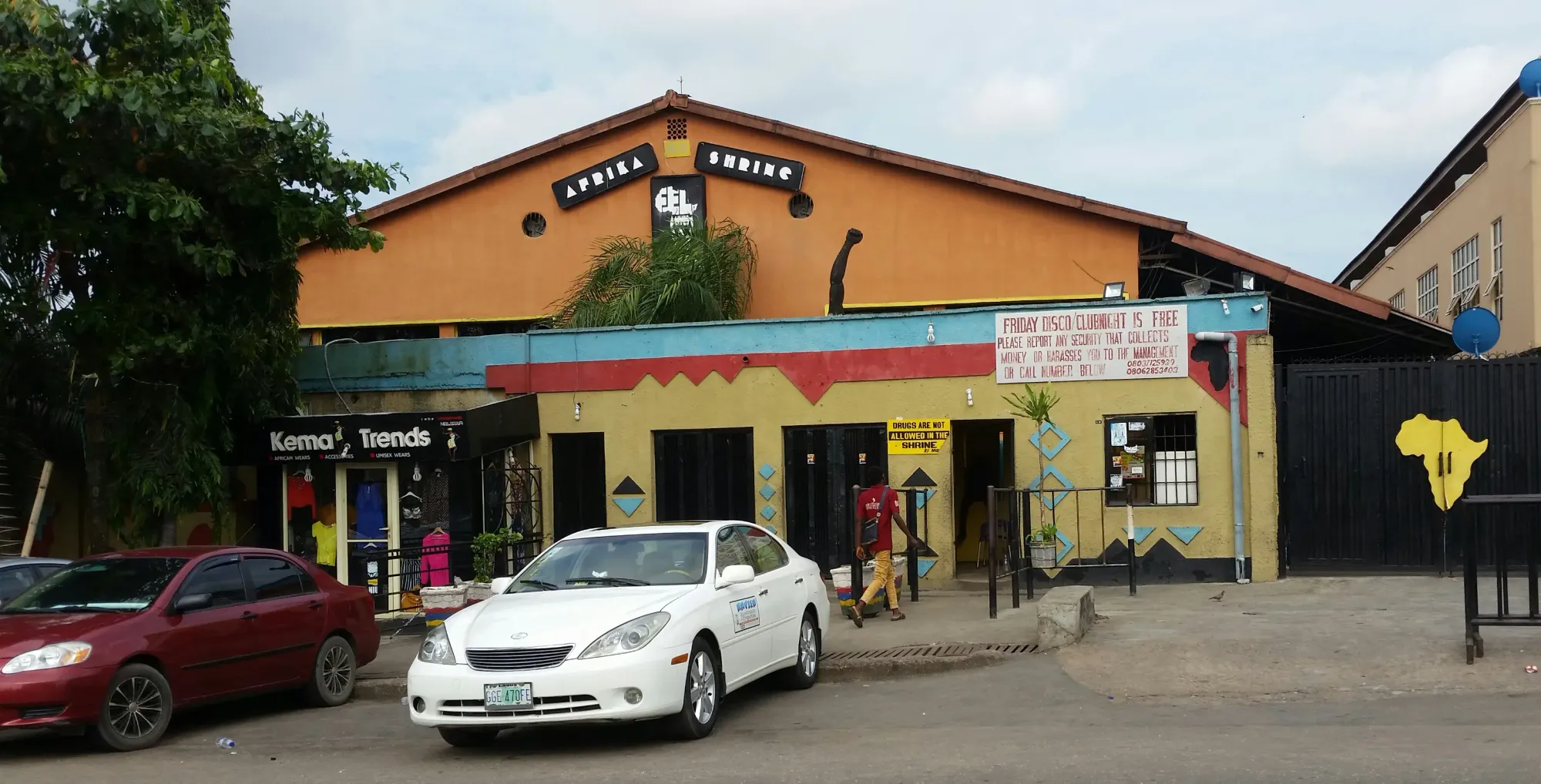
Every Thursday and Sunday, the Shrine pulses with live performances by Femi Kuti, Made Kuti, and a rotation of Afrobeat acts that keep Fela’s legacy alive. The crowd is an eclectic mix—locals, global fans, old-school revolutionaries, and curious tourists all vibing under the smoky haze of incense, palm wine, and basslines.
There’s no dress code, no velvet rope—just rhythm, community, and a stage where the music still speaks truth to power.
⭐⭐⭐⭐⭐ - Neha Patel
Free to peruse during day. Grungy venue to see the artwork and colorful set up, posters of great activists. Quick stop during day, but musical shows on Sundays and other days are probably fun.
Essential Info:
- Hours: Open daily; live shows typically Thurs & Sun evenings
- Admission: Free entry; ₦1,000–₦2,000 for special performances
- Website: afrikashrine.com
- Best For: Music lovers, night owls, cultural adventurers
- Tip: Go with a group and arrange transport ahead—it's in Ikeja, and late-night transit can be tricky
11. Discover Jaekel House
📍 Location: Railway Compound, Ebute Metta, Lagos Mainland
Fun Fact:
Built in 1898, Jaekel House was once the residence of senior British railway officers during colonial rule. It’s now a museum and photo hotspot.
In a city that’s constantly evolving, Jaekel House is a gentle reminder of Lagos’ colonial past—and a hotspot if you’re into architecture, photography, or rail history.
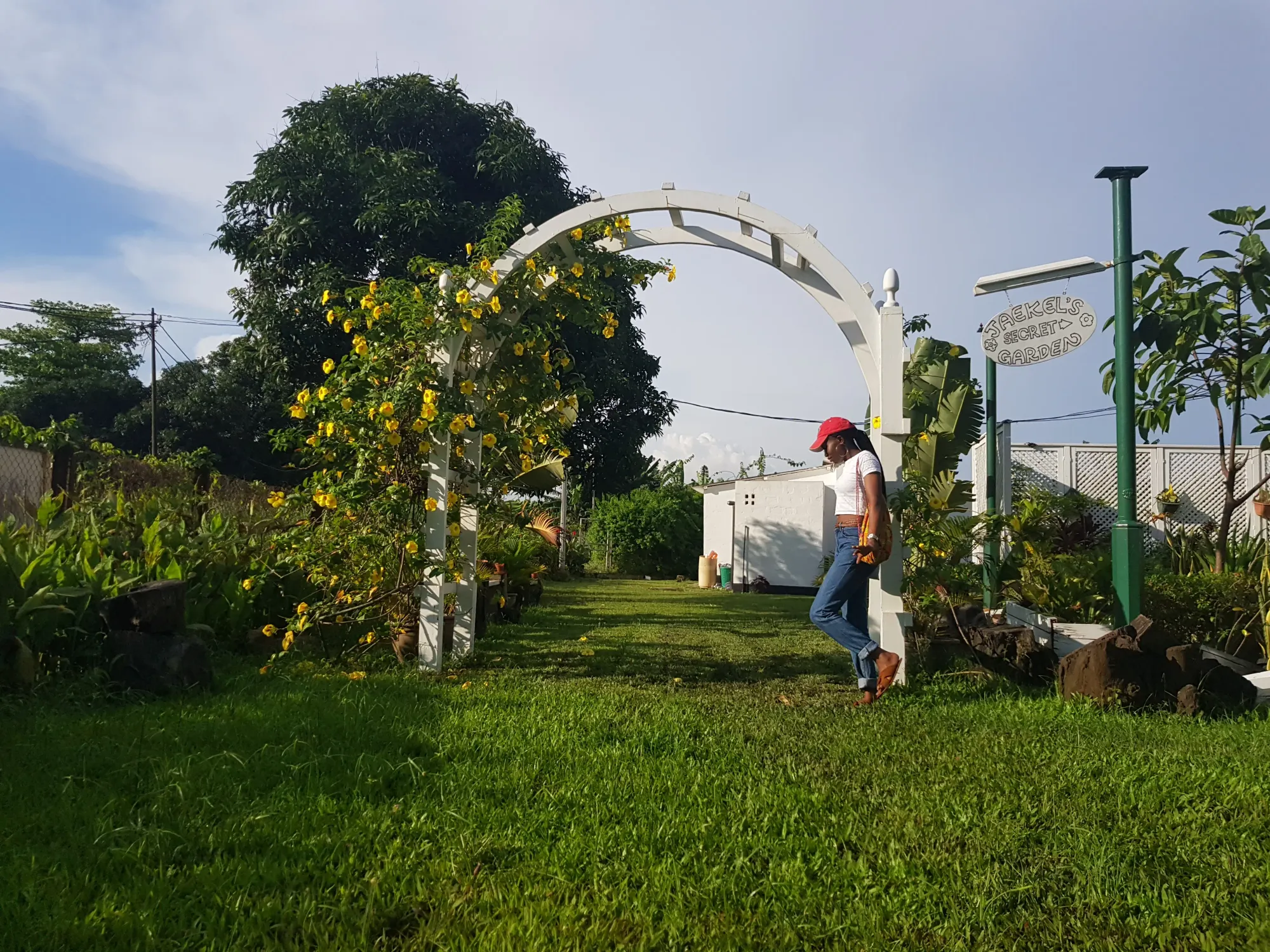
The restored colonial mansion, with its white-washed facade, wraparound porch, and manicured gardens, now serves as a railway museum filled with vintage photographs, artifacts, and uniforms from Nigeria’s pre- and post-independence rail era. The grounds are calm, green, and unexpectedly peaceful—a sharp contrast to the chaos of the mainland outside its gates.
It’s also become a favorite backdrop for photo shoots, films, and heritage tours, making it a low-key gem for creatives and history buffs alike.
⭐⭐⭐⭐⭐ - Omozo Ogunronbi
Oh wow! A great and unexpected experience 😍
Old relics littered the compound. There is a huge picnic field at the back of the building. Very clean surroundings. Helpful and knowledgeable staff. We enjoyed ourselves very much.
The grounds are popular for music videos, movies, wedding shoots, parties and all good things. 👍🏾
Essential Info:
- Hours: Mon–Sat, 9 a.m.–6 p.m.
- Admission: ₦500–₦1,000
- Best For: History lovers, architecture fans, photographers
- Tip: Visit in the late afternoon when the light is perfect for photos
- Bonus: The Railway Compound itself is full of hidden gems—explore!
12. Visit the Cathedral Church of Christ
📍 Location: 29 Marina Road, Lagos Island
Fun Fact:
Consecrated in 1946, this Anglican cathedral was the first church built with reinforced concrete in Nigeria—and remains one of the city’s most iconic buildings.
With its Gothic revival architecture, soaring stained glass, and stately columns, the Cathedral Church of Christ is a spiritual and architectural landmark in Lagos Island’s Marina district. It’s a place where you can take a deep breath, admire intricate craftsmanship, and hear a choir that can raise goosebumps—even if you’re not religious.
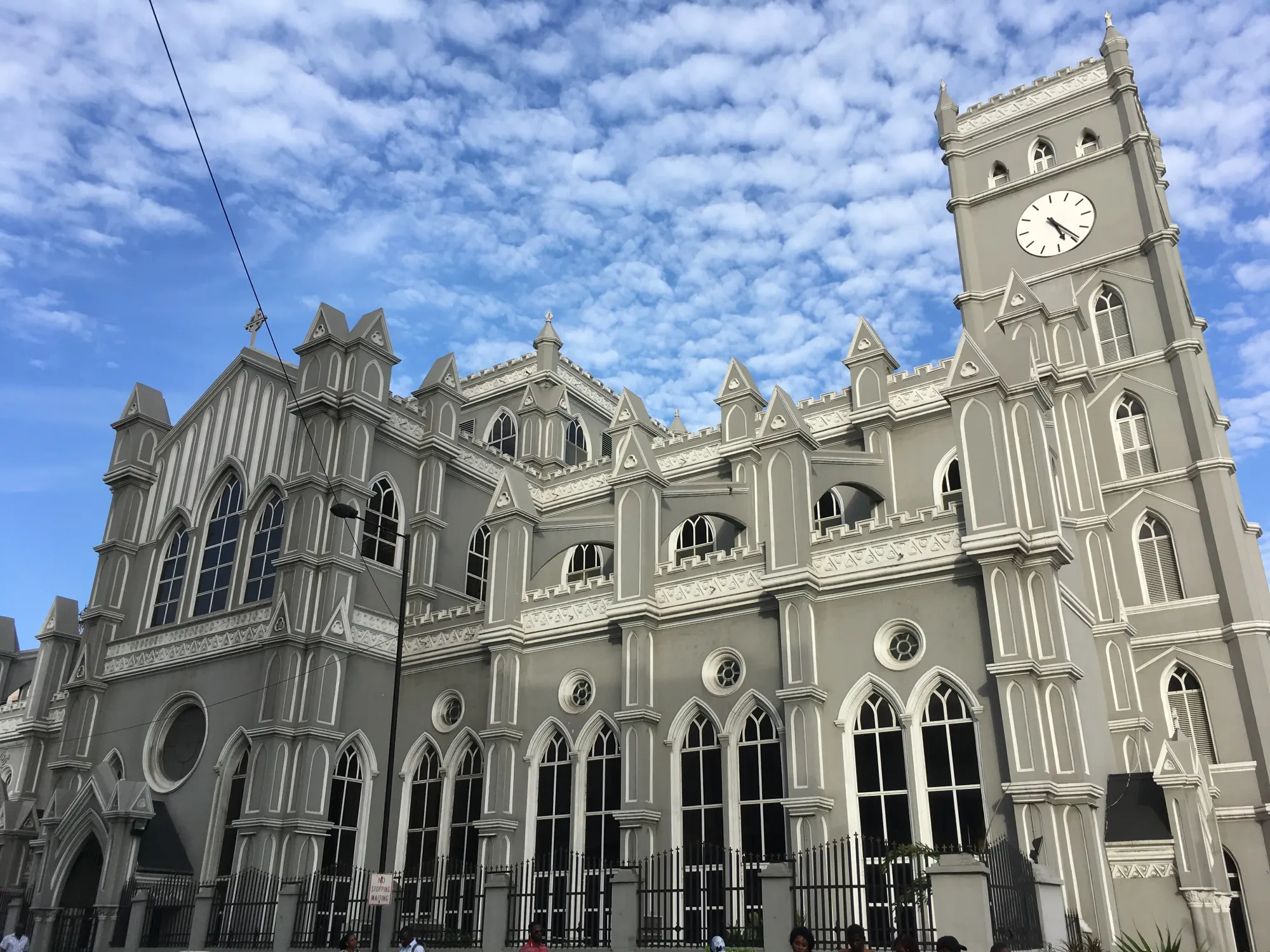
Set amid the hustle of downtown Lagos, the cathedral stands as a symbol of grace, endurance, and cultural fusion, blending British colonial influences with Nigerian worship traditions. Step inside during a service and you’ll hear a powerful mix of Anglican liturgy and local choral music, often sung in Yoruba and English.
It’s not just a church—it’s a quiet moment in a loud city.
Essential Info:
- Hours: Open daily, services typically held Sun & Wed
- Admission: Free (donations welcome)
- Best For: Architecture lovers, spiritual travelers, photographers
- Tip: Dress modestly, and if visiting during service hours, be respectful of worshippers
13. Shop at Balogun Market
📍 Location: Lagos Island (spanning from Idumota to CMS)
Fun Fact:
Balogun Market isn’t one building—it’s a labyrinth of thousands of stalls and street vendors, forming one of West Africa’s largest open-air markets.
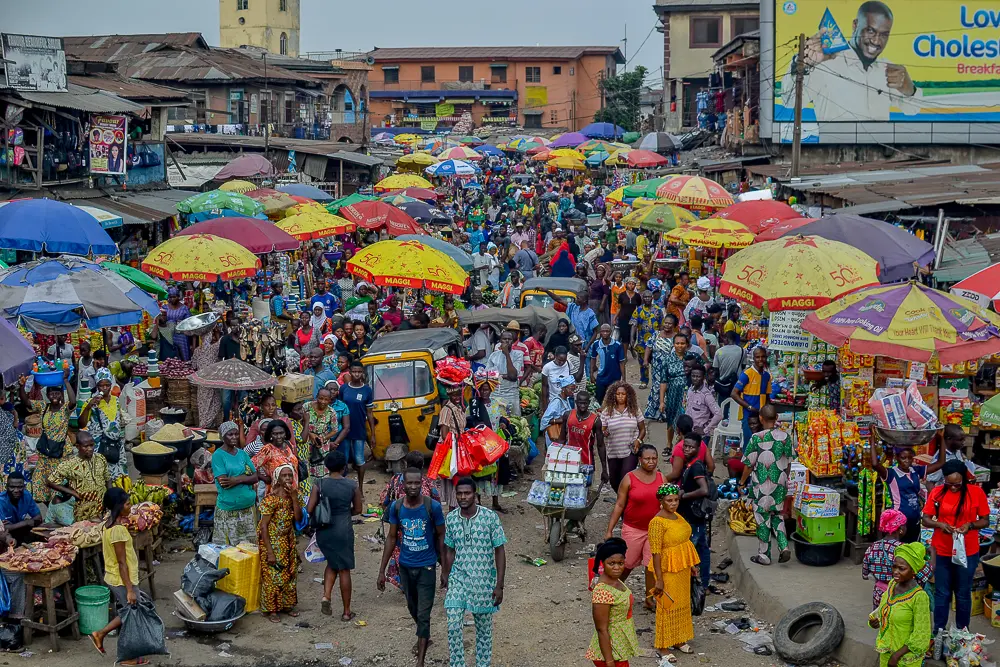
If you're ready for a true Lagos experience—unfiltered, energetic, and a little chaotic—Balogun Market is it. This sprawling commercial district is where the city’s pulse is loudest, and shopping here is as much an adventure as a transaction.
You’ll find Ankara fabrics in every pattern imaginable, sequined lace, beads, wigs, electronics, handbags, kitchen supplies, school uniforms, perfumes—you name it, it's probably for sale here.
Come prepared: this place is fast, loud, and crowded. You’ll hear a chorus of vendors shouting deals, dodge wheelbarrow pushers, and maybe even haggle over a piece of embroidered fabric you didn’t know you needed.
Essential Info:
- Hours: Mon–Sat, 8 a.m.–6 p.m. (avoid Sundays)
- Admission: Free
- Best For: Bargain hunters, fashion lovers, adventurous travelers
- Tip: Wear closed shoes, bring small cash, and keep valuables close—pickpocketing is real
- Bonus: Ask a local or guide to show you around—it’s easy to get turned around in the maze
Lagos has an entire neighborhood (Eko Atlantic) built on reclaimed ocean land?
14. Explore Makoko Floating Village
📍 Location: Lagos Mainland, near the 3rd Mainland Bridge
Fun Fact:
Often dubbed the “Venice of Africa,” Makoko is a self-sustaining community where over 100,000 people live on stilts over water, mostly without government infrastructure.
Makoko is not a tourist attraction—it’s a reality check on water. Built on stilts over the Lagos Lagoon, this floating village is home to tens of thousands of people, many living without basic infrastructure but with a fierce sense of community and resilience.
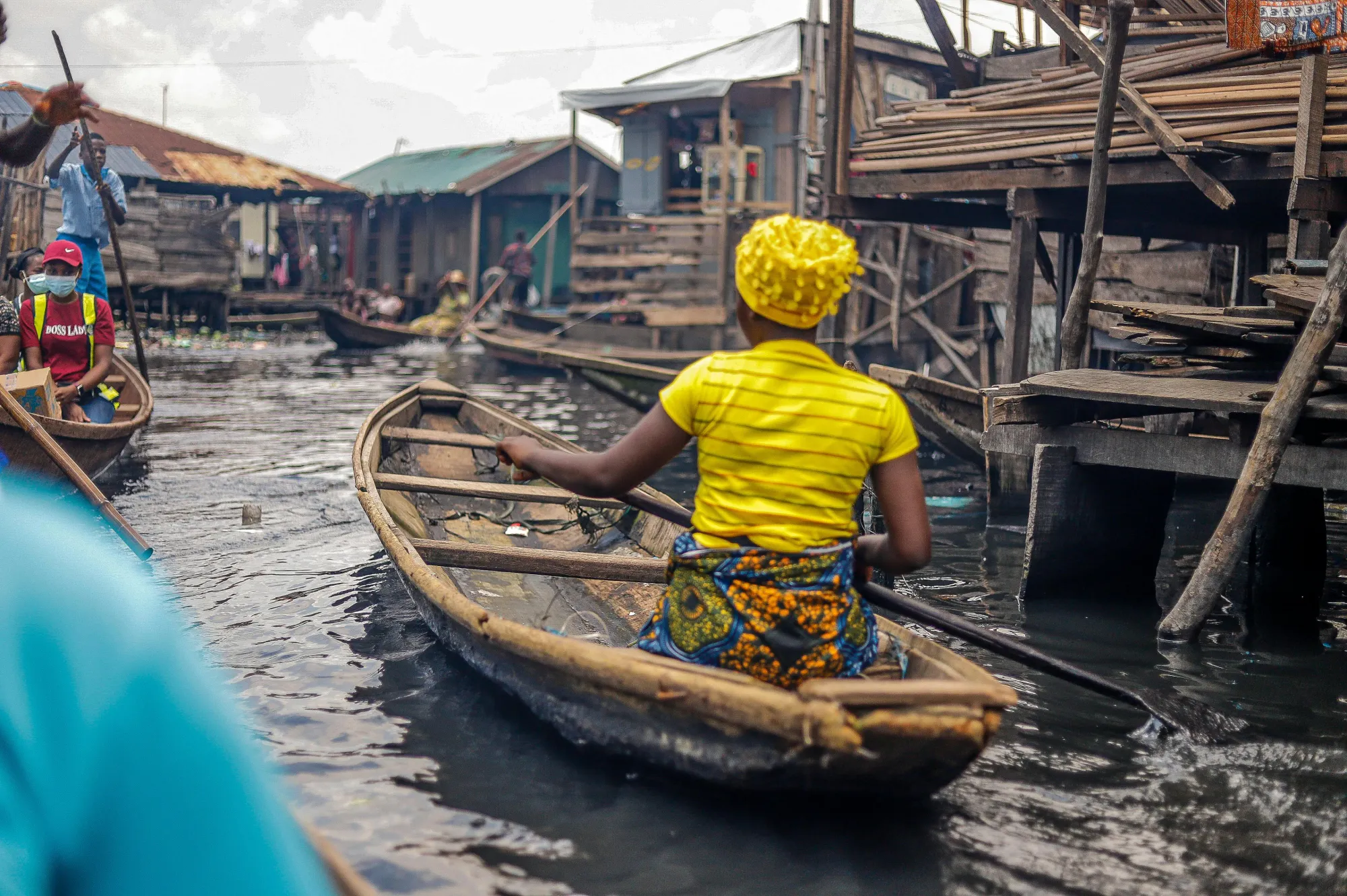
Forget sanitized brochures. Makoko is Lagos at its most unfiltered—wooden canoes instead of taxis, fish-smoking huts beside schools, children paddling through narrow waterways with the ease of city cyclists. A guided canoe tour shows you the beating heart of a place most people overlook or write off entirely.
You’ll see poverty, yes—but also ingenuity, grit, and an architecture of survival. You’ll leave with more questions than answers, and that’s the point. Makoko is not here to entertain you. It dares you to pay attention.
Essential Info:
- Hours: Daytime tours only, ideally 9 a.m.–3 p.m.
- Tour Cost: ~₦5,000–₦10,000 per person (varies by guide)
- Best For: Cultural travelers, photographers, documentary seekers
- Tip: Book through trusted local NGOs or fixers (e.g., Social Prefect Tours or Lagos Urban Development Initiatives)
- Ethics Note: Ask before taking photos; this is a lived-in space, not a show
15. Relax at Elegushi Beach
📍 Location: Lekki Phase 1, Lekki Peninsula, Lagos
Fun Fact:
Owned by the Elegushi royal family, this is one of the few privately run beaches in Lagos—and it’s famous for its nightlife and concerts.
If you're looking for Lagos at full volume, Elegushi Beach is where the city’s love for music, movement, and mixology collides with crashing waves. By day, it’s a chill spot to unwind on the sand, ride horses, or sip cold drinks at a beach shack. By night, the beach transforms into a party zone, with DJs, bonfires, and sometimes full-blown concerts spilling into the surf.
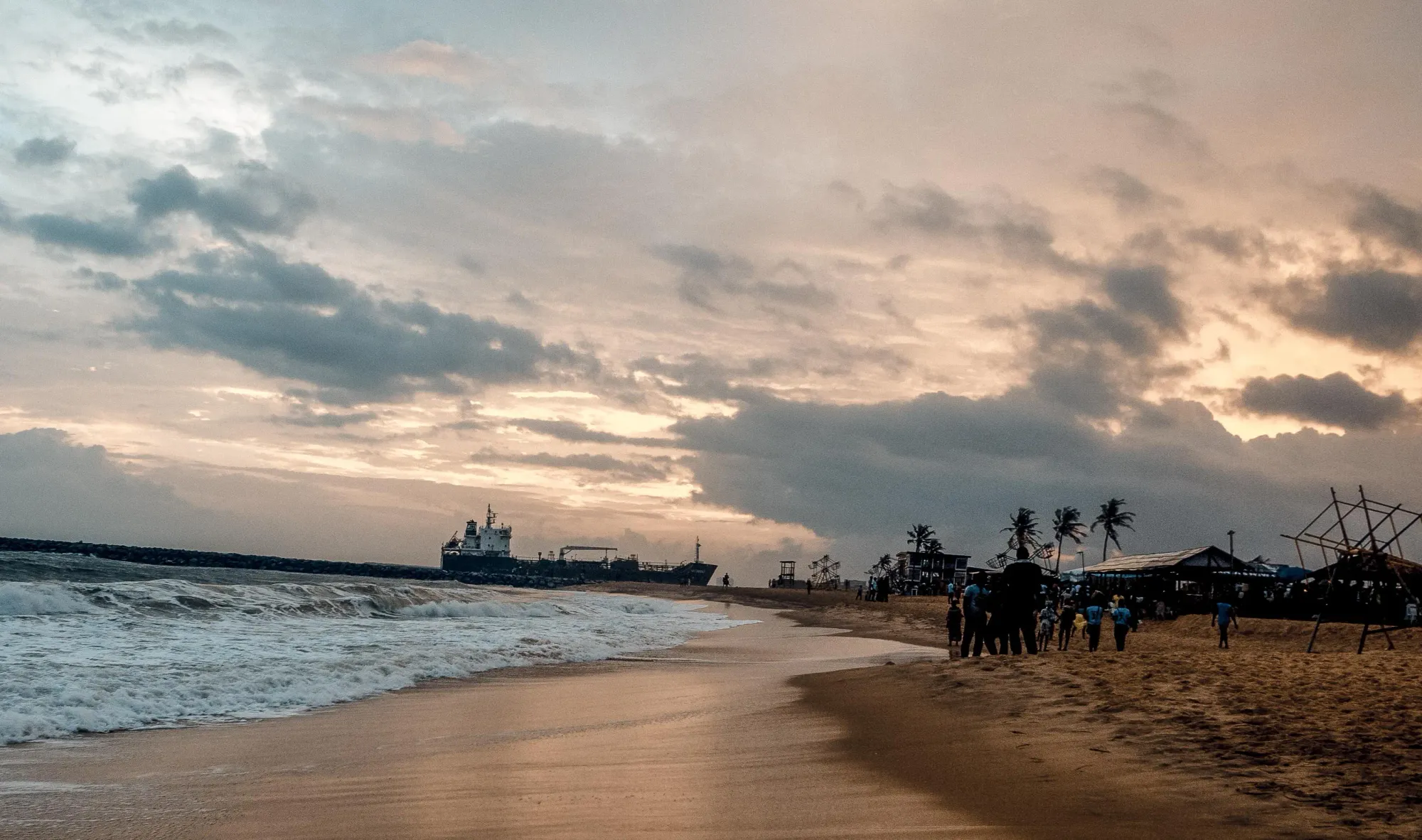
It’s not pristine or peaceful like Tarkwa Bay, but it’s full of life. Think: loud Afrobeats, grilled fish sizzling on open flames, and vendors hawking sunglasses and suya.
Essential Info:
- Hours: Daily, 24/7 (most active Thurs–Sun)
- Admission: ~₦2,000–₦3,000 entry; activities extra
- Best For: Party lovers, friend groups, nightlife seekers
- Tip: Go with locals if it’s your first time and avoid bringing valuables
- Bonus: Arrive around sunset for great lighting and fewer crowds before the evening rush
16. Visit Omenka Gallery
📍 Location: 24 Ikoyi Crescent, Ikoyi, Lagos
Fun Fact:
Omenka is housed in the waterfront residence of Ben Enwonwu, one of Nigeria’s most celebrated modernist painters.
After the intensity of Lagos markets and nightlife, a visit to Omenka Gallery feels like stepping into a quiet conversation with Nigerian art history. This sleek, intimate gallery showcases contemporary African art—from photography and sculpture to experimental installations—against the calming backdrop of the Ikoyi waterfront.
The curation is world-class, with a strong focus on themes like identity, post-colonialism, and African futurism. Many of the featured artists have exhibited internationally, but here, you get to experience their work up close, in an atmosphere that feels personal and profoundly local.
⭐⭐⭐⭐⭐ - Nnaemezie Asogwa
When you walk into Omenka Gallery, you'd first love to take photographs if you are like me! I was enchanted by the greenery and flowers that surround the facility. If you are an art lover who loves gallery visits, yes, you will find the usual exhibition space with beautiful pieces arranged on the walls and sculptures posing at different corners etc. But here, there's a bit of a difference which comes from the surroundings. You'll find a bar space at the main entrance as well as a cosy seat out by the seaside.
The staff are very courteous and responsive. And their pepper goat meat was absolutely yummy!!! Lol. This place is quiet and classy for all I care. Just an entirely different kind of destination to seat out and have drinks or even a kind of quiet time earlier in the day.
Essential Info:
- Hours: Mon–Sat, 10 a.m.–6 p.m. (closed Sundays)
- Admission: Free
- Website: omenkagallery.com
- Best For: Art lovers, creatives, culture travelers
- Tip: Time your visit around exhibition openings—they often include artist talks and live performances
17. Experience LUFASI Nature Park
📍 Location: Majek 1st Gate, KM 41, Lekki-Epe Expressway, Lagos
Fun Fact:
LUFASI stands for Lekki Urban Forest and Animal Sanctuary Initiative—a conservation project preserving Lagos' disappearing green spaces.
In a city famous for traffic and towering development, LUFASI Nature Park offers something radical: silence, trees, and time to breathe. This 20-hectare conservation park protects endangered flora and fauna while giving city dwellers a chance to reconnect with nature, and it’s one of the most family-friendly, meaningful things to do in Lagos.
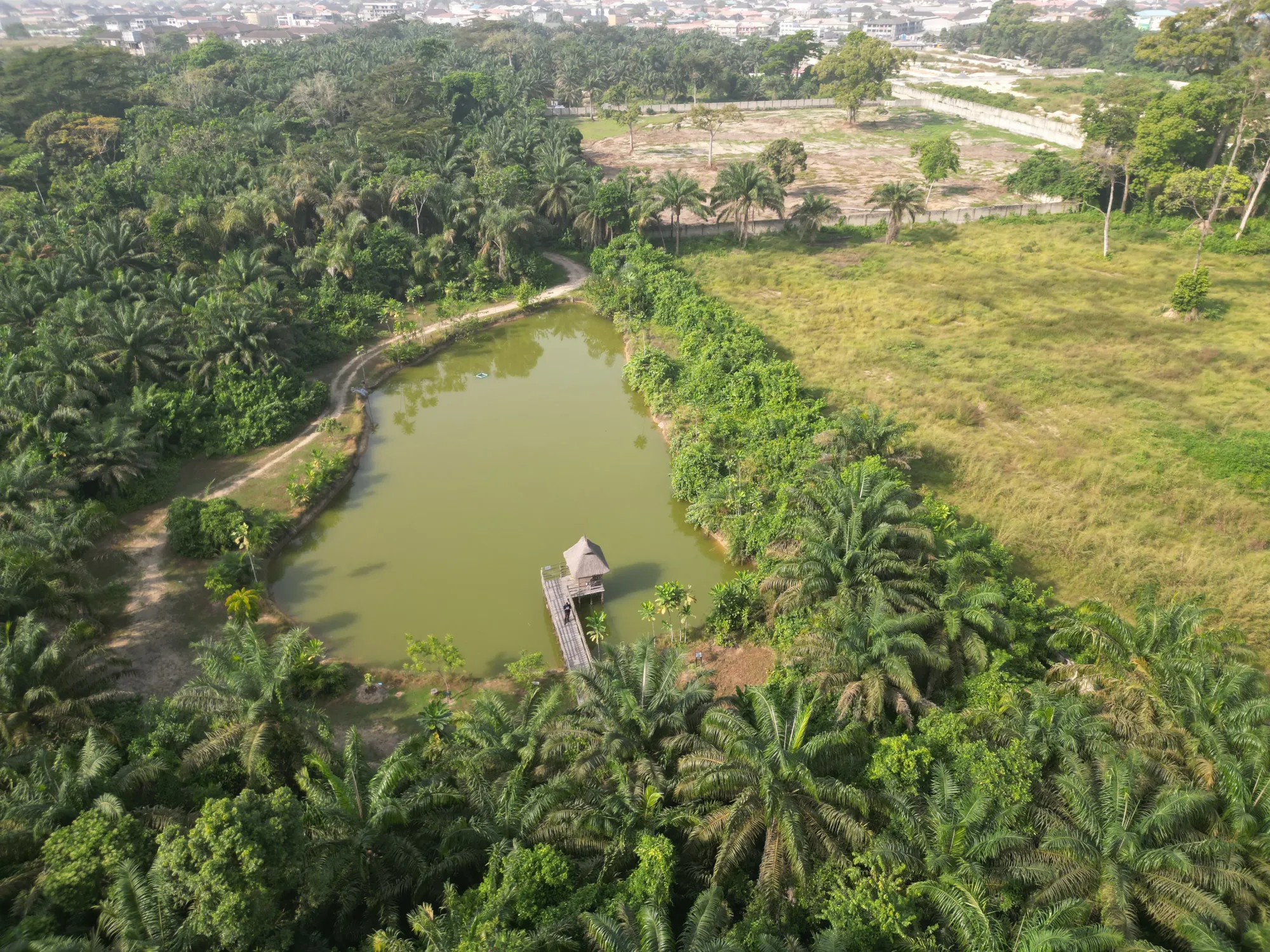
Wander through shaded trails, picnic spots, and bamboo groves, or visit the animal sanctuary where rescued donkeys, monkeys, and parrots live in peaceful enclosures. The park also features eco-education zones, a forest therapy walk, and the iconic Lake Moses—a small lake ideal for reflective moments or casual photography.
⭐⭐⭐⭐⭐ - Abdulganeey Adeboye Oyegbemi
Its a cool place when you need a calm ambience but there is no side attractions. It is a typical location for friends hangout when you go along with your friends, beach mat and every necessary items you need. Aside that nothing interesting aside just walking in calm nature
Essential Info:
- Hours: Daily, 9 a.m.–6 p.m.
- Admission: ~₦1,000–₦1,500
- Website: lufasipark.org
- Best For: Families, eco-tourists, school groups, nature lovers
- Tip: Visit early before the heat picks up; bring water, sunscreen, and cash
18. Dine at Yellow Chilli
📍 Location: 27 Oju Olobun Close, Victoria Island & 35 Joel Ogunnaike St, Ikeja
Fun Fact:
Helmed by Chef Uzor Orimalade, Yellow Chilli helped pioneer the New Nigerian Cuisine movement—reimagining local favorites with upscale flair.
For a taste of Lagos that's equal parts comfort and sophistication, book a table at Yellow Chilli. This polished but unpretentious restaurant turns Nigerian classics into artfully plated dishes—ofada rice with designer stew, seafood okra, pepper soup, and their famous jollof rice fiesta served in a sizzling skillet.
The vibe is cool, the service is sharp, and the food hits with a mix of nostalgia and reinvention.
Essential Info:
- Hours: Daily, 12 p.m.–10:30 p.m.
- Average Meal: ₦7,000–₦15,000 per person
- Website: yellowchilli.ng
- Best For: Foodies, date nights, business lunches
- Tip: Reserve ahead for dinner—especially at the Victoria Island location on weekends
You can find live music 7 days a week in Lagos? From Fela’s Shrine to rooftop lounges, the city never sleeps.
19. Indulge at Hans and Rene Gelato
📍 Location: Radisson Blu Anchorage Hotel, Victoria Island + select branches in Lagos
Fun Fact:
Founded by Tara Fela-Durotoye, Hans and Rene is one of Nigeria’s first truly artisanal dessert brands, blending Italian technique with Nigerian flair.
Lagos heat meets its match at Hans and René, the city’s go-to gelato spot where cold treats feel like a small luxury. Walk into the sleek, glass-fronted space and you’re met with rows of handcrafted gelato in bold, unexpected flavors—zobo sorbet, malted milk, agbalumo, and Nigerian coffee all swirl alongside classic chocolate and pistachio.
This isn’t just dessert—it’s Lagos creativity in a cup. Each scoop is rich, smooth, and balanced, made in small batches with local ingredients and a lot of heart. The vibe is minimalist and cool, the branding on point, and the flavors unforgettable.
Grab a seat by the water at the Radisson Blu or stroll the Lagos Island at night with a cone in hand. It’s sweet, stylish, and a perfect pause between adventures.
⭐⭐⭐⭐⭐ - Anthony Alkosseifi
Had an amazing experience at Hans & René The ice cream was absolutely delightful – creamy, flavorful, and with a great variety of options to choose from. The shop itself was cozy, clean, and beautifully set up, creating a welcoming atmosphere. The staff were friendly and attentive, making the visit even more enjoyable. Definitely one of the best spots to satisfy your sweet cravings. I’ll be back for more!
Essential Info:
- Hours: Daily, 11 a.m.–9 p.m.
- Price Range: ₦2,000–₦6,000 per person
- Website: hansandrene.com
- Best For: Foodies, couples, post-dinner treats
- Tip: Try the agbalumo sorbet—it’s sweet, tangy, and totally Lagos
20. Explore Muri Okunola Park
📍 Location: Adeyemo Alakija Street, Victoria Island, Lagos
Fun Fact:
Named after Justice Muri Okunola, Lagos State’s first Muslim Chief Judge, this park is one of the few well-maintained green spaces in the heart of the city.
In the middle of Lagos’ constant motion, Muri Okunola Park is a rare pocket of stillness—a place to catch your breath without leaving the city. Neatly manicured lawns stretch between palm trees and flowerbeds, while shaded benches offer front-row seats to people-watching, impromptu photo shoots, and midday escapees on lunch break.
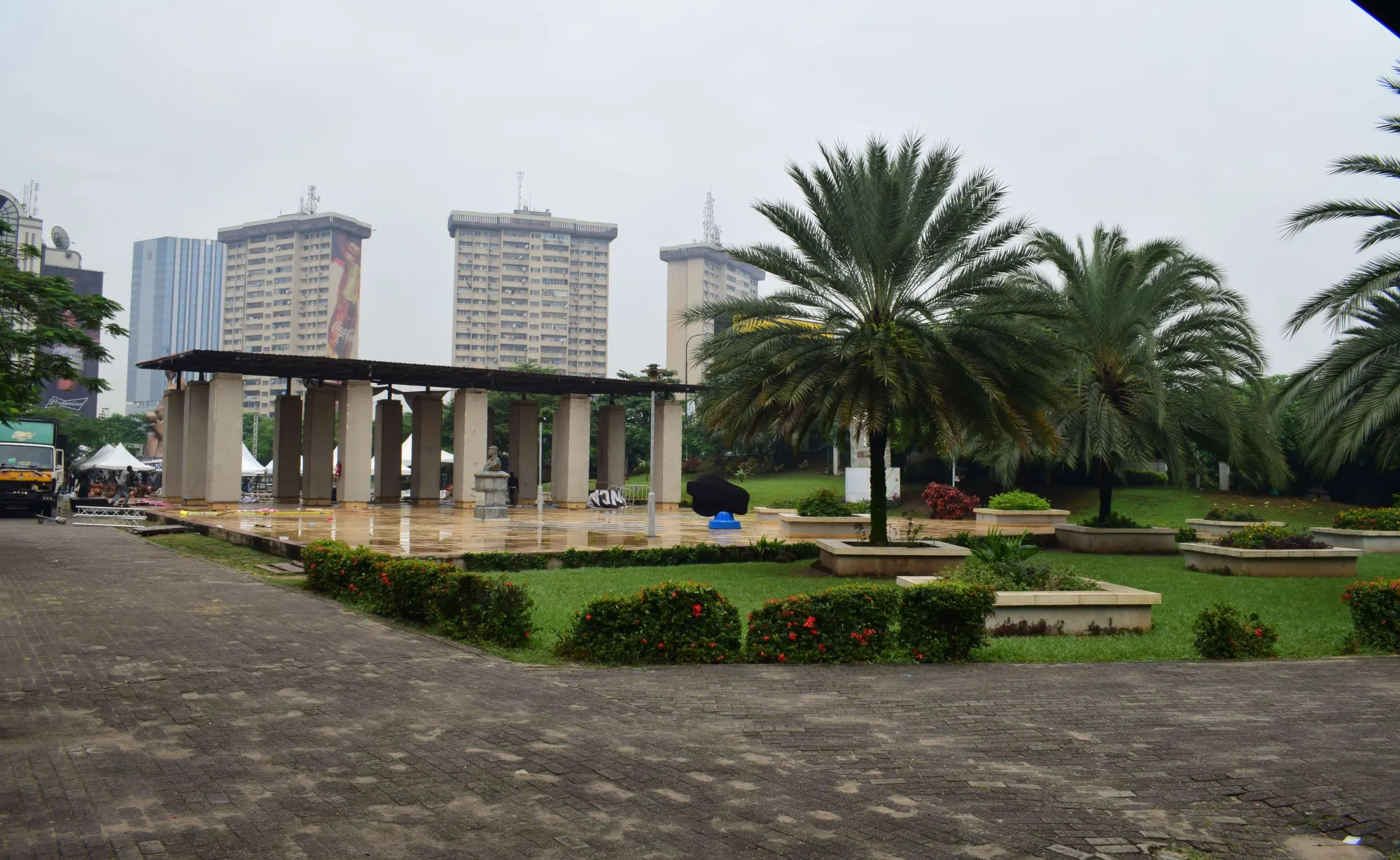
On weekdays, it’s peaceful. On weekends, it transforms into a hub of activity—fitness boot camps, art markets, live music, food pop-ups, and open-air events that give the park its pulse. You’ll see joggers circling the perimeter, families spreading out picnic blankets, and Lagosians of all kinds taking a break from the grind.
It’s clean, safe, and open to all—one of the few green spaces in VI that feels both public and personal.
⭐⭐⭐⭐⭐ - fayokun bode
Is a popular recreational spot! The lush greenery and scenic views made for a perfect picnic spot. We enjoyed a delicious BBQ, played games, and laughed together. The kids had a blast on the playground, and we even took a refreshing stroll around the lake. The atmosphere was lively, with live music and great company. Can't wait to come back!
Essential Info:
- Hours: Daily, 8 a.m.–7 p.m.
- Admission: Free
- Best For: Locals, expats, solo travelers, wellness enthusiasts
- Tip: Pack a picnic or grab a takeout lunch from nearby Terra Kulture or Yellow Chilli and enjoy it here
21. Play at Upbeat Recreation Centre
📍 Location: 11 Admiralty Road, Lekki Phase 1, Lagos
Fun Fact:
Opened in 2017, Upbeat is the first-ever trampoline park in West Africa, designed for all ages—from toddlers to pro athletes.
If you’ve had your fill of museums and marketplaces and you're craving some movement, Upbeat Recreation Centre is the spot to burn off energy and have serious fun doing it. This state-of-the-art indoor facility features wall-to-wall trampolines, foam pits, ninja courses, climbing walls, and even fitness classes for adults.
Kids can bounce around in supervised zones while adults join in—or grab a smoothie and chill in the café. For travelers with kids, it's one of the best family-friendly things to do in Lagos, especially on hot or rainy days when outdoor plans fall through.
It’s clean, well-managed, and adrenaline-packed—all in the heart of Lekki.
Essential Info:
- Hours: Tues–Sun, 10 a.m.–8 p.m. (Closed Mondays)
- Admission: ₦4,000–₦10,000 depending on activity/session
- Website: upbeatcentre.com
- Best For: Families, teens, fitness lovers, rainy-day activities
- Tip: Book your session in advance—weekends and holidays fill up quickly
22. Adventure at Lekki Leisure Lake
📍 Location: Opposite Prince Ebeano Supermarket, Lekki Phase 1, Lagos
Fun Fact:
This lagoon-side resort is one of the few places in Lagos where you can combine water sports, motorbike thrills, and laid-back beach vibes in one place.
Part beach club, part adventure park, Lekki Leisure Lake is the kind of spot where you can chill or thrill, depending on your mood. Nestled beside the Lekki Lagoon, this waterfront escape offers everything from jet skiing, quad biking, and pedal boats to beach volleyball and cabana lounging.
It’s ideal for groups, couples, or anyone looking for outdoor excitement that doesn’t require leaving the city. You can come for a few hours or spend the whole day soaking in the sun, breeze, and the occasional splash from a jet ski.
⭐⭐⭐⭐⭐ - Chibuike Big mahrez blaq
In the darkest time, I have always believed, the light will shine. Being realistic is the most common path to mediocrity.
Essential Info:
- Hours: Daily, 12 p.m.–10 p.m.
- Admission: ₦2,000+ (activities priced separately)
- Website: lekkileisure.com
- Best For: Adventure lovers, groups, date outings
- Tip: Go midweek to avoid the weekend crowds and book water sports early—they sell out fast.
23. Visit the Upside Down House
📍 Location: Admiralty Way, Lekki Phase 1, Lagos
Fun Fact:
Nigeria’s first and only upside-down house flips reality—literally—creating one of the city’s most Instagrammable stops.
What’s it like?
The Upside Down House in Lagos isn’t just a photo stop—it’s a surreal, walk-in illusion that bends logic and flips your sense of direction. Step inside and find an entire home suspended above you: beds, sofas, dining tables, even curtains—all mounted to the ceiling. The floor? Above your head.
Every room is designed for one thing: disorientation that makes you grin. Snapshots that look like you're floating midair or standing on the ceiling. The layout is simple, but the effect is wildly effective—and strangely satisfying.
It’s a short visit, but it punches above its weight in creativity. Kids love it. Teens snap selfies. Adults can’t help but grin. And it’s a hit for birthday shoots and TikToks alike.
Essential Info:
- Hours: Daily, 10 a.m.–7 p.m.
- Admission: ₦2,000–₦3,000
- Best For: Families, content creators, curious minds
- Tip: Wear bold colors—they pop best against the quirky backgrounds
- Bonus: Combine this with nearby stops like Hans & Rene or Upbeat Centre for a full Lekki experience
There are over 250 different ethnic groups living in Lagos?
24. Tour Glover Memorial Hall
📍 Location: 4 Glover Road, Lagos Island
Fun Fact:
Built in 1887, this was one of the first public performance spaces in West Africa and a cornerstone of colonial Lagos’ cultural life.
Few buildings in Lagos can claim as much cultural weight as Glover Memorial Hall. Named after British colonial administrator Sir John Hawley Glover, this stately, colonial-era hall has hosted everything from jazz concerts and school plays to town meetings and independence-era debates.
Today, it remains a hub for Lagos’ creative class, staging everything from Nollywood premieres and poetry slams to Yoruba-language theater and musical showcases. The architecture has been lovingly preserved, and stepping inside is like walking back into the pages of Nigerian history.
Essential Info:
- Hours: Open during scheduled performances/events
- Admission: Varies per event (₦2,000–₦10,000)
- Best For: Theatergoers, historians, cultural travelers
- Tip: Check eventbrite.com.ng or local listings for upcoming shows
- Bonus: Pair with a visit to Freedom Park, just minutes away
25. Explore Idumota Market
📍 Location: Lagos Island, near Carter Bridge and Nnamdi Azikiwe Street
Fun Fact:
Idumota is home to one of the largest concentrations of street traders in all of West Africa, and also a historic hub for Nollywood’s early film distribution.
Stepping into Idumota Market is like entering the beating heart of Lagos Island. The crowds are dense, the stalls stacked to the skies, and the sensory overload? Total. If you want to experience Lagos the way locals live it, this is one of the most authentic (and intense) places to go.
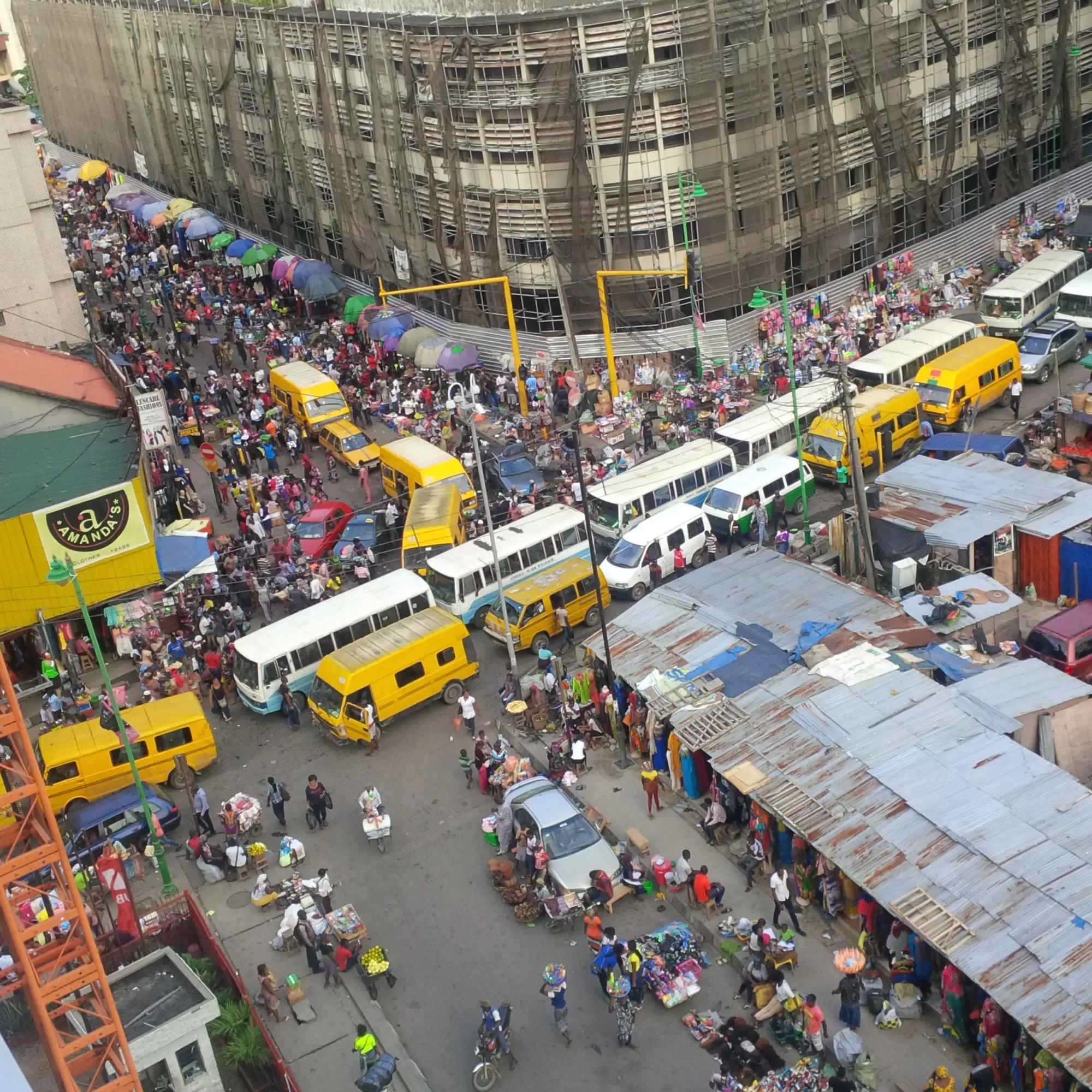
You’ll find everything here—from cheap electronics and household goods to fabrics, wigs, wedding supplies, and DVDs of old Nollywood films. It’s less curated than Balogun Market and more chaotic, but that’s also what makes it unforgettable.
Navigating Idumota is a full-contact sport. Be ready to haggle, sweat, and keep moving. But if you're up for it, the rewards include unique finds, unforgettable characters, and a front-row seat to Lagos' unfiltered commerce.
Essential Info:
- Hours: Mon–Sat, 8 a.m.–6 p.m.
- Admission: Free
- Best For: Cultural explorers, bargain hunters, urban photographers
- Tip: Don’t flash valuables; travel light and go with a local guide if you’re unfamiliar with the area
- Bonus: Look up as you walk—some of the city’s most storied buildings line the market streets
26. Attend a Festival
📍 Location: Varies by event (Lagos Island, Tafawa Balewa Square, Bar Beach, etc.)
Fun Fact:
The Eyo Festival—also called the Adamu Orisha Play—is unique to Lagos and believed to have inspired Brazil’s famous Carnival.
To really feel the spirit of Lagos, you have to join the celebration. The city’s festivals are loud, proud, and deeply rooted in tradition.
If you’re in town during the Lagos Carnival, expect parades, elaborate costumes, dance troupes, and a multicultural mash-up of Brazil-meets-Yoruba energy. For something more sacred and dramatic, the Eyo Festival features white-robed masqueraders called Eyo gliding through the streets with staffs, paying homage to the city’s ancestors in a moving, once-in-a-lifetime procession.
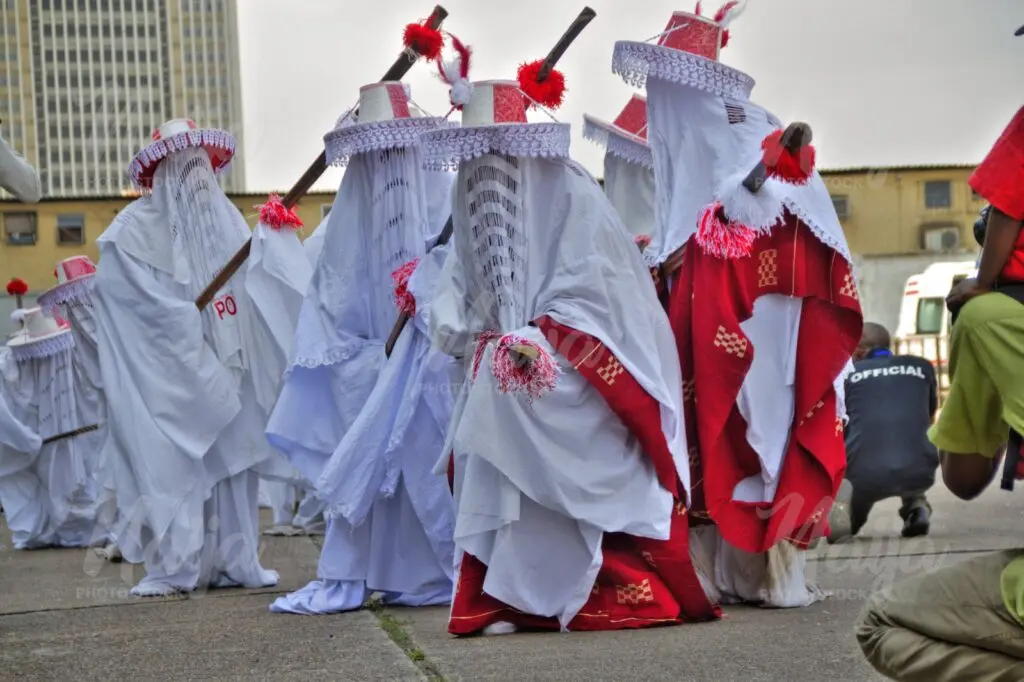
Other festivals like Felabration (celebrating Fela Kuti), GTBank Fashion Weekend, or Art X Lagos showcase Lagos' edge in music, fashion, and creativity. Time your trip right, and you’ll catch a version of Lagos that can’t be bottled or repeated.
Essential Info:
- Timing: Events occur throughout the year (April–November peak season)
- Admission: Mostly free; concerts and venues may charge (~₦2,000–₦15,000)
- Best For: Festival lovers, cultural travelers, content creators
- Tip: Check social media or tourism boards (like @VisitLagos or @FelabrationNG) for dates, lineups, and road closures
- Bonus: Dress vibrant! Lagos festivals are a feast for the eyes—and the camera
27. Visit the National Theatre
📍 Location: Iganmu, Lagos Mainland
Fun Fact:
The National Theatre was built in 1976 for FESTAC ’77, the Second World Black and African Festival of Arts and Culture. Its design was inspired by a military cap!
Few buildings in Nigeria are as iconic—or as symbolic—as the National Theatre. With its UFO-meets-Brutalist architecture and massive 5,000-seat main hall, this monumental structure stands as a proud emblem of Nigeria’s post-independence cultural ambition.
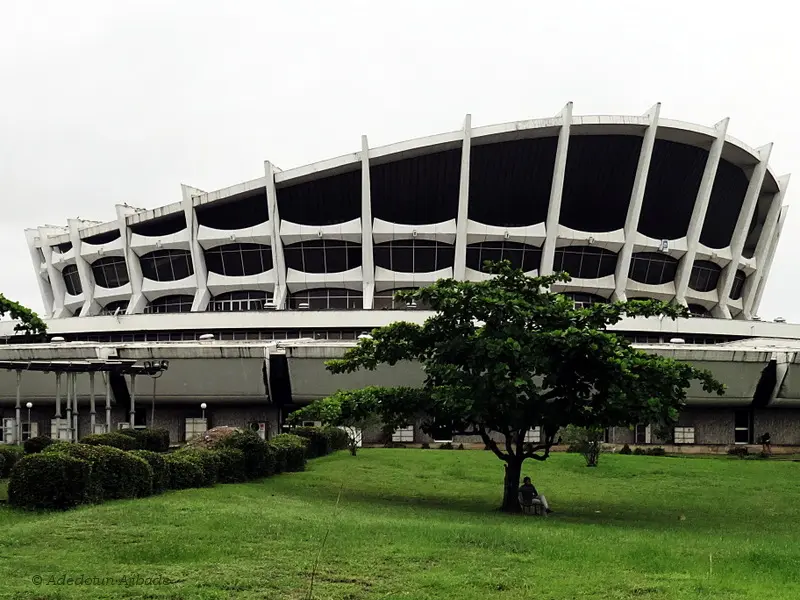
Inside, you’ll find rotating exhibitions, theater performances, dance shows, and film screenings celebrating both traditional and contemporary Nigerian arts. Even when quiet, the space feels sacred, echoing decades of storytelling, celebration, and resistance.
⭐⭐⭐⭐⭐ - Olayinka Koleaje (Oluwatobi)
This location is truly top-tier. It was neat, perfectly clean, and assessing the area was effortless. The staff and security officers deserve major kudos for their kindness and helpful demeanor
Essential Info:
- Hours: Daily, 8 a.m.–6 p.m. (events vary by schedule)
- Admission: Entry is often free; event tickets vary (₦1,000–₦10,000)
- Best For: Culture seekers, architecture lovers, performance art fans
- Tip: Visit in the evening for scheduled shows, or during public holidays for major cultural events
- Bonus: Bring your camera—this structure is one of Lagos’ most photogenic landmarks
28. Relax at Whispering Palms Resort
📍 Location: Iworo/Ajido Town, Badagry, Lagos
Fun Fact:
This resort isn't just for sunbathing—it also houses a mini-museum, a zoo, and a palm-lined lagoon that actually whispers with wind through the trees (yes, really).
When you need a break from the madness of the city, Whispering Palms Resort delivers a peaceful coastal escape with a side of cultural insight. Located about two hours from central Lagos in Badagry, this beachside retreat offers charming accommodations, swaying coconut trees, and a view of the lagoon that seems to melt stress on sight.
Enjoy paddle boating, a bike ride, or explore the on-site museum, which includes exhibits on Badagry’s slave trade history and Yoruba culture. It’s family-friendly, couple-friendly, and perfect for a quiet reset.
Essential Info:
- Hours: Open daily; overnight stays recommended
- Admission: Day passes ~₦1,500; room rates from ₦25,000+
- Website: whisperingpalmslagos.com
- Best For: Families, couples, weekend getaways
- Tip: Pair this with a visit to Badagry Slave Museum nearby for a full cultural weekend
29. Golf at Lakowe Lakes
📍 Location: Km 35, Lekki-Epe Expressway, Lakowe, Ibeju-Lekki, Lagos
Fun Fact:
Lakowe Lakes is often called the “Pebble Beach of West Africa”—and for good reason. Its championship course is set against serene lakes and sculpted fairways.
Tucked away on the outskirts of Lagos, Lakowe Lakes offers a calm, green world far from the city’s chaos. This 18-hole championship course isn’t just for golfers—it’s a designed experience that blends precision sport with scenic indulgence. Think rolling fairways, reflective lakes, and palm-lined paths under a sky that always feels wider here.
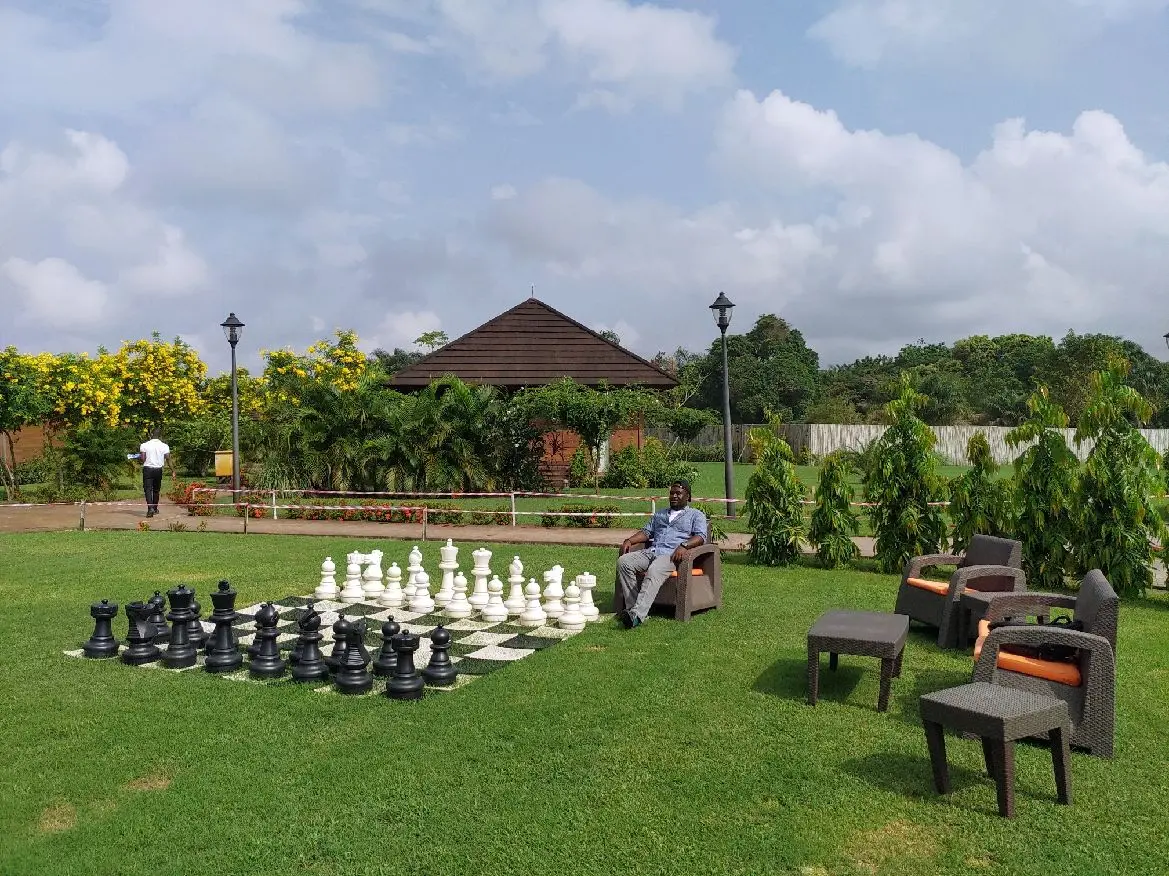
The course was designed to challenge seasoned players, but it’s also welcoming to beginners. Golf carts hum across perfectly trimmed greens, while caddies offer tips like local sages of the sport. After your game, unwind at the clubhouse with a cold drink and a front-row view of the water.
It’s peaceful, professional, and polished without feeling cold. At Lakowe, the pace slows, your swing matters, and the Lagos skyline feels a world away.
⭐⭐⭐⭐⭐ - sunny day
Great experience. Our team at the office went there for a two day staycation. Serene and beautiful ambience, with a feeling of being one with nature. A bit on the outskirts, but that made the experience more memorable. Didn't try the food there, but every other thing was spot on.
Essential Info:
- Hours: Daily, 7 a.m.–7 p.m.
- Green Fees: ~₦30,000+ (packages vary)
- Website: lakowelakes.com
- Best For: Golfers, executives, romantic getaways
- Tip: Book your tee time and lunch reservation in advance—slots fill fast on weekends
- Bonus: Stay the night to enjoy their luxurious eco-lodges and spa amenities
30. Unwind at Jara Beach Resort
📍 Location: Museyo, Eleko, Ibeju-Lekki (about 1.5 hours from VI)
Fun Fact:
Jara Beach Resort is Nigeria’s first all-inclusive beach resort, offering curated day passes with gourmet meals, drinks, and full beach access.
Think of Jara Beach Resort as your reward at the end of a long Lagos week. Nestled on a quiet stretch of Eleko Beach, this boutique beachfront property is all about relaxation with intention: hammocks swaying in the breeze, gourmet meals served alfresco, and mojitos arriving just when you need them.
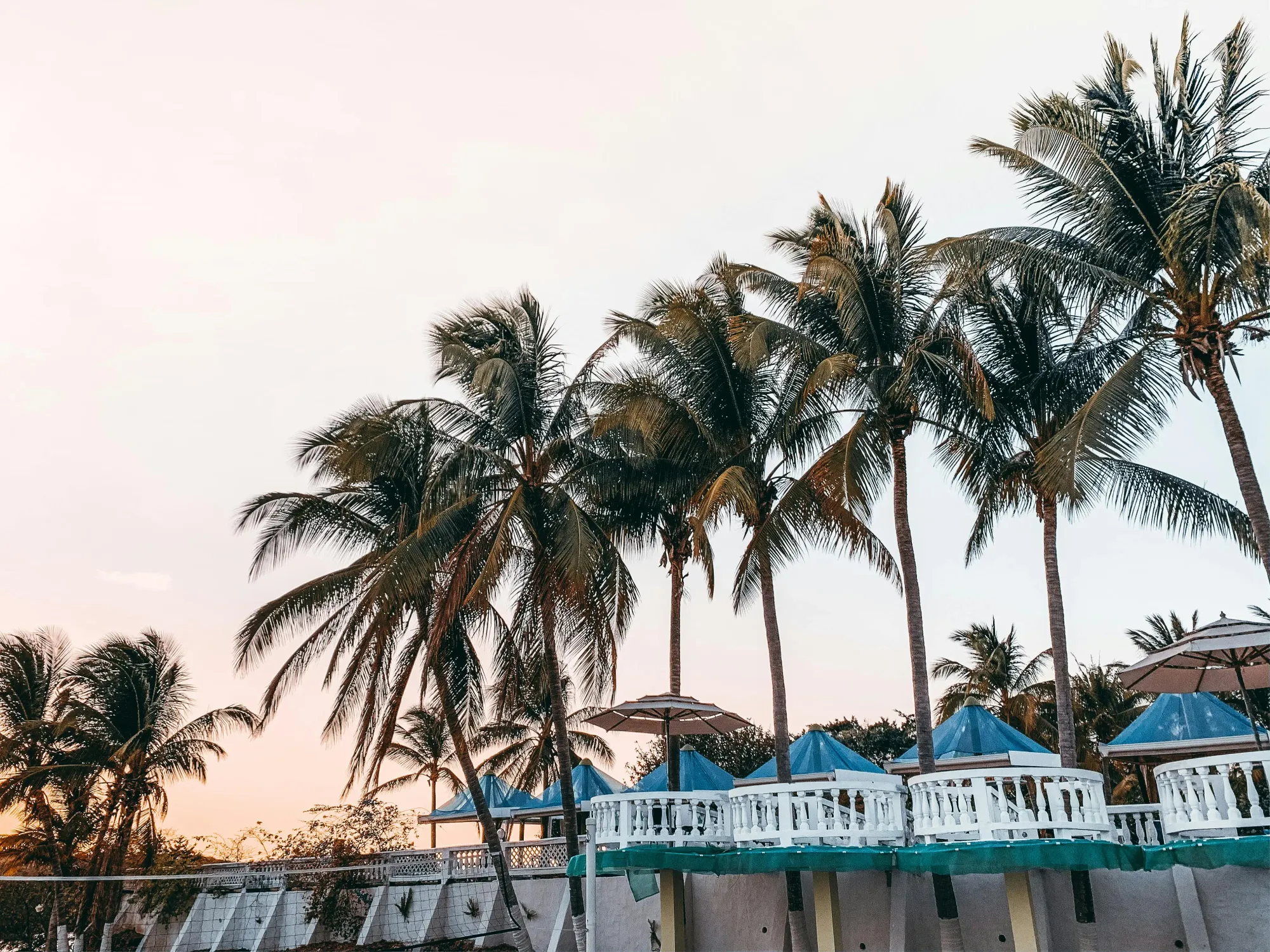
You can come for the day or stay overnight in one of their eco-luxe chalets. Either way, you’re signing up for a curated coastal escape that blends Nigerian hospitality with resort-level amenities.
⭐⭐⭐⭐⭐ - Tolulope E
The room, environment, food, drinks, and amenities were fantastic! I would definitely visit again. Best birthday weekend
Essential Info:
- Hours: Day pass visits run 10 a.m.–6 p.m.
- Day Pass Price: ~₦50,000 per adult (includes 3-course meals, drinks, beach access)
- Website: jarabeachresort.com
- Best For: Couples, honeymooners, friend groups, luxury staycations
- Tip: Book well in advance—day passes and stays sell out quickly on weekends
- Bonus: Ask for a beachfront massage or sunset bonfire—it’s next-level chill
Conclusion
Lagos isn’t a place you visit. It’s a place you feel in your feet on the dance floor, in your hands bargaining in the market, in your chest as the waves hit the shore at Tarkwa Bay, and in your heart as a street performer plays highlife under the sunset.
From sipping gelato in Lekki to tracing history in Badagry, Lagos wraps its arms around you with 30 unforgettable things to do—loud and soulful, peaceful and poetic, chaotic and utterly alive. It’s not a city you control; it’s one you surrender to.
So, pack your curiosity and your camera. Lagos is ready when you are.
FAQ
1. What is Lagos known for?
Lagos is known for its vibrant energy, cultural diversity, and unmatched creative spirit. It’s Nigeria’s commercial and entertainment capital—famous for Afrobeat music, Nollywood films, bustling markets, and a fast-paced lifestyle. From beach resorts to urban nightlife, Lagos is a city that never sleeps.
2. Is Lagos worth visiting?
Absolutely. Lagos offers a unique blend of culture, history, adventure, and luxury. Whether you're exploring the floating village of Makoko, attending a concert at Freedom Park, or relaxing at a beach resort like Jara, Lagos delivers an unforgettable travel experience—especially for those open to the raw, real beauty of African cities.
3. What are the best times to visit Lagos, Nigeria?
The best time to visit Lagos is during the dry season, from November to March. You’ll avoid heavy rains and enjoy ideal weather for beach outings, festivals, and exploring the city. December is especially festive, with concerts, fashion events, and art shows lighting up the city.
4. How far is Lekki from Lagos Mainland?
Lekki is about 20 to 30 kilometers from Lagos Mainland, depending on your exact start and end points. Travel time can vary wildly due to traffic—it could take 45 minutes to 2 hours by car. If you’re heading to Lekki for beach resorts or galleries, plan your travel outside of peak rush hours.
5. Is Lagos safe for tourists?
Lagos can be safe for tourists if you take common-sense precautions. Stick to well-known areas like Victoria Island, Lekki, and Ikoyi, and avoid wandering into unfamiliar neighborhoods alone, especially at night. Use trusted transportation apps or hotel-recommended drivers, and stay alert in crowded markets.
6. What’s the weather like in Lagos?
Lagos has a tropical climate with two main seasons: wet and dry. Expect hot and humid weather year-round, with temperatures typically ranging from 25°C to 33°C (77°F to 91°F). The rainy season runs from April to October, while the dry season (November to March) is sunnier and more popular for travel.


